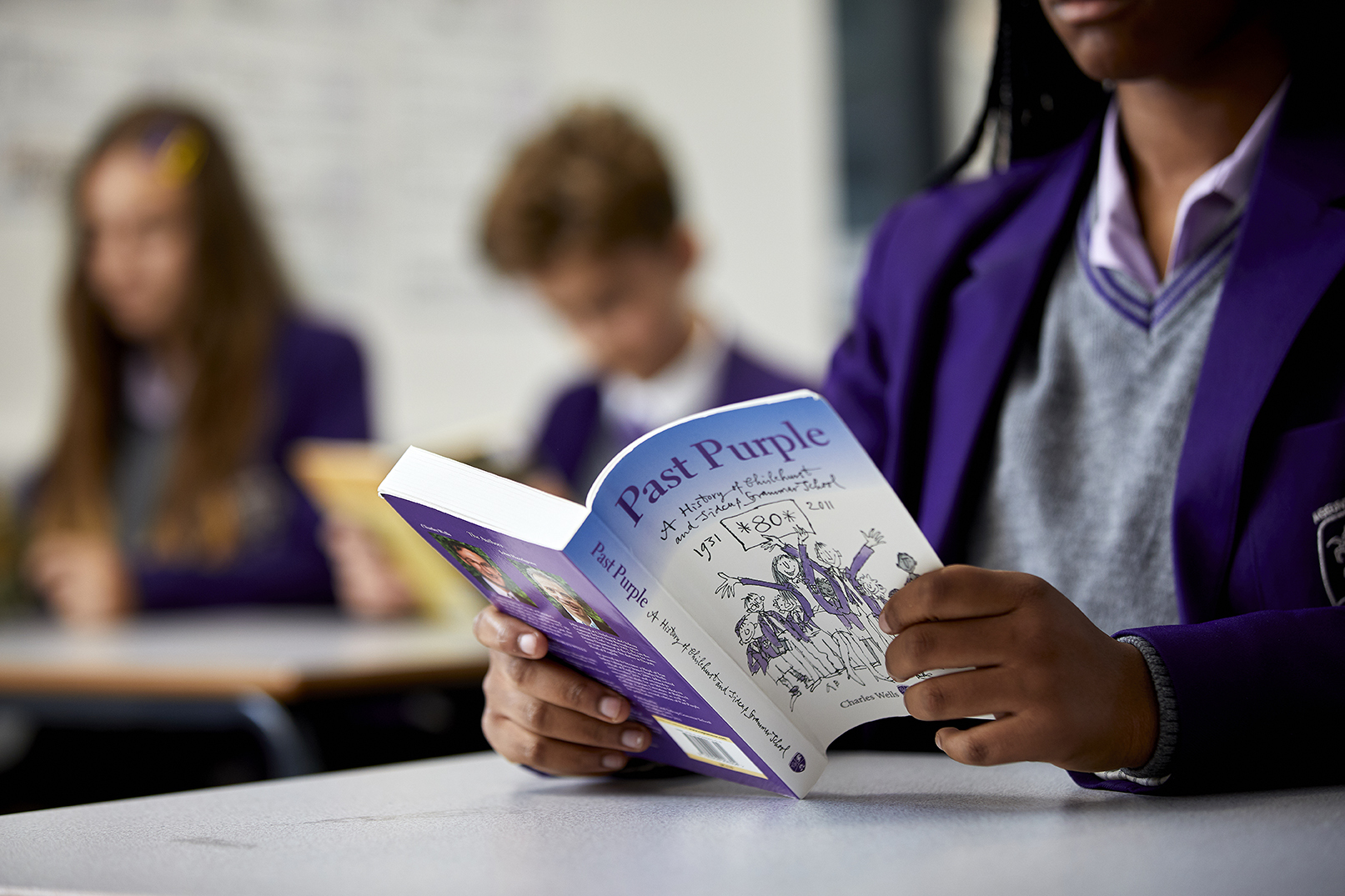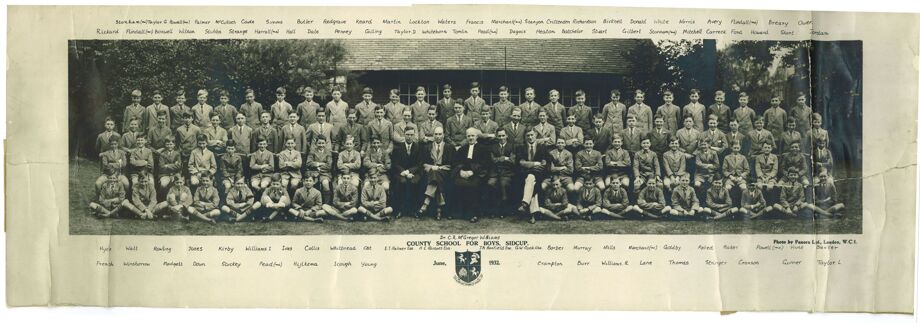Alumni

The old boys and girls of the school are known as Sedcopians.
The Sedcopians Association
The Sedcopian Association has been in existence for over 70 years. Membership is free and open to all ex-scholars and past & present members of staff.
The main objective of the Association is to maintain contact with fellow Alumni and the wider school community.
The Association offers many benefits, including growing a network of like-minded professional contacts, invites to exclusive Alumni events, in-school Alumni talks – members regularly come back and speak to current students about life post ‘Purple’ and their journey they have taken. Alumni members also act as fantastic career role models, helping with work experience placements and school events.
If you are a former student or former member of staff, we would love you to join the Sedcopians Association. We are always fascinated to hear what our former students and former teachers have gone on to do.
The Sedcopians Hall of Fame
Download The Sedcopians Hall of Fame
Sedcopian Hall of Fame
“Please let us know who else needs to be included”
Ollie Robinson (Professional Cricketer: Durham, Kent and England)
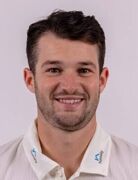
Ollie Robinson was born in Sidcup and attended Hurstmere School before studying for his A Levels at Chislehurst and Sidcup Grammar School. He played age group cricket for Kent, scoring 251 for the under-17 side during 2016, He was awarded a place in Kent's cricket academy in 2014 and won the John Aitken Grey Trophy, awarded to the most promising academy scholar of the year, in both 2016 and 2017. In 2017, he was named in the England Under-19 squad for a series of matches against India and again against South Africa the following summer. Further representative honours came in 2019-20 when he was included on the England Lions tour of Australia.
Ollie has built a burgeoning reputation as one of the best young wicketkeeper-batters in the country with Kent and, latterly, Durham.
He made his senior debut for Kent aged 18, in the final match of the Regional Super50 in the West Indies, and earned his first professional contract in September 2017 after deputising with the gloves on several occasions. A first-class bow came the following summer and it was not long before he was the club's No. 1 gloveman in red-ball cricket.
In 2019, he scored 765 runs in 14 Championship matches, including two hundreds. His maiden first-class century, a five-hour 143 at Edgbaston, helped set up an eight-wicket Kent win. He added two more tons in the 2021 season but became increasingly frustrated at his lack of limited-overs opportunities behind Sam Billings and Jordan Cox. During 2022 he went out on loan to Durham to gain T20 experience.
Ollie returned to play for Kent later in the season and was awarded his county cap before playing in the county's winning One-Day Cup side. He scored the first double hundred of his career during the campaign, making a Kent record 206 not out against Worcestershire. The scintillating, unbeaten 206 from 131 balls in the One-Day Cup hinted at his ability, as Kent went on to win the trophy in 2022. He also played in the side's final County Championship matches of the season.
His experience of playing at Chester-le-Street in 2022 led Robinson to depart from Kent despite still having a year left on his contract. Towards the end of September announced that he would be joining Durham on a three-year contract ahead of the 2023 season and he headed north permanently at the end of the 2022 season.
His decision was immediately validated as he began life at Durham by averaging 58.18 with three hundreds - including a career-best 167 not out at Leicestershire - in their Division Two title-winning campaign, as well as producing his best-ever return in the T20 Blast.
Mia McKenna-Bruce (BAFTA-winning Actress)
 Mia McKenna-Bruce joined the sixth form at Chislehurst and Sidcup Grammar School in 2008. Mia gained prominence through her role as Tee Taylor in Tracey Beaker Returns (2010–2012) and The Dumping Ground (2013–2018).
Mia McKenna-Bruce joined the sixth form at Chislehurst and Sidcup Grammar School in 2008. Mia gained prominence through her role as Tee Taylor in Tracey Beaker Returns (2010–2012) and The Dumping Ground (2013–2018).
Her films include Persuasion (2022), Kindling (2023) and How to have Sex (2023) in the latter she played the role of Tara. Her performance as an inexperienced schoolgirl grappling with issues of consent while on holiday in Crete was widely praised and led to her being identified as a Screen Star of Tomorrow by Screen Daily. The performance also won Mia a British Independent Film Award, the BAFTA Rising Star Award and the Best Breakthrough Performer of the Year at the 2023 London Film Critics Circle Awards, she was also nominated for the European Film Award for Best Actress.
Mia’s first role was a ballet girl in the West End production of Billy Elliot the Musical. Her first TV role was the minor role of Ester, Small dark Places. She then starred in Holby City as Abi Taylor and then appeared in Eastenders as Penny Branning. Mia’s other credits include The Bill, Doctors, The Rebels, The Witcher and Vampire Academy. In 2020, she began portraying the role of Bree Deringer on the iPlayer teen thriller series Get Even. In 2021, she appeared in an episode of Vera later being cast in the Netflix film Persuasion.
Sam Nunn (Team GB Rower and World Champion)
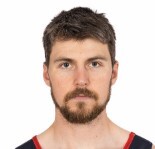 Sam Nunn joined Chis and Sid from Hurstmere School for his Sixth Form studies. On leaving school Sam was awarded a rowing scholarship at the University of Washington. Sam achieved numerous successes in rowing and athletics, including a bronze medal in the British Championships Single Scull, gold in the Ghent International Regatta 4x and he became silver medallist in the U23 High School Crash B's Indoor World Championships.
Sam Nunn joined Chis and Sid from Hurstmere School for his Sixth Form studies. On leaving school Sam was awarded a rowing scholarship at the University of Washington. Sam achieved numerous successes in rowing and athletics, including a bronze medal in the British Championships Single Scull, gold in the Ghent International Regatta 4x and he became silver medallist in the U23 High School Crash B's Indoor World Championships.
Sam subsequently studied at Oxford Brookes University. Representing Team GB he became a World Champion in 2022, winning the Men’s Four at the World Rowing Championships with William Stewart, David Ambler and Freddie Davidson, covering the 2000m in a time of 05:48:29 ahead of Australia.
Following a series of injuries, Sam is back to fitness and in the 2024 Henley Royal Regatta he was part of the Grand Challenge Cup winning team from Oxford Brookes University and Taurus Boat Club.
Matthew Rowland (Multi-talented Thespian)
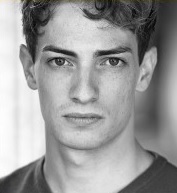 Matthew Rowland, is a renowned actor, director, singer and choreographer. On leaving Chis and Sid he attained First Class BA (Hons) in Musical Theatre from The Arts Educational School.
Matthew Rowland, is a renowned actor, director, singer and choreographer. On leaving Chis and Sid he attained First Class BA (Hons) in Musical Theatre from The Arts Educational School.
After his graduation, he portrayed the character of Boy George in Taboo at the Brixton Club House and in New York, a performance for which Rowland received a BroadwayWorld UK Awards nomination for the Best Leading Actor in a Musical. He has also appeared in West End productions Charlie and the Chocolate Factory (Mr Beauregarde), Joseph and the Amazing Technicolor Dreamcoat and Waitress. His credits also include School of Rock and Nativity the Musical.
More recently, Matthew played Mr Wormwood and Rudolpho in Matilda the Musical (Cambridge Theatre/RSC) and he is currently playing the role of Mr Wormwood in the RSC’s Matilda the Musical, International Tour. Matthew also toured internationally with Trevor Nunn’s Cats as Skimbleshankd.
As a choreographer, he has worked in Putting It Together (St James Theatre & G Live) and Gypsy the Musical at Bird College, Sidcup. Apart from being a wonderful actor, Matthew has also directed several shows including Dee-Licious, Lightful and Lovely, and The Robbing Glass.
Matthew also worked as the Children’s Director whilst engaged with Charlie and the Chocolate Factory. He has co-founded Vibes Arts Theatre School which provides Musical Theatre training as well as a number of extra-curricular Performing Arts workshops.
Richard Quinn (International Fashion Designer)
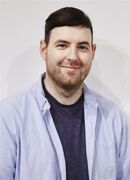 Richard Quinn joined the sixth form at Chislehurst and Sidcup Grammar School in 2006 to study A Level Art after completing GCSE’s at St Thomas Moore. On contemplating a number of options open to him toward the completion of A Levels, he applied to Central St Martins and was offered a place on the Foundation Year Course, then completed a degree in Fashion. He moved on to gain a highly competitive place on the prestigious MA Fashion degree at St Martins Central, an international hotbed for talent and recognised as a springboard into the international fashion industry.
Richard Quinn joined the sixth form at Chislehurst and Sidcup Grammar School in 2006 to study A Level Art after completing GCSE’s at St Thomas Moore. On contemplating a number of options open to him toward the completion of A Levels, he applied to Central St Martins and was offered a place on the Foundation Year Course, then completed a degree in Fashion. He moved on to gain a highly competitive place on the prestigious MA Fashion degree at St Martins Central, an international hotbed for talent and recognised as a springboard into the international fashion industry.
Richard went on to be head hunted by Dior and worked in the head offices in Paris. He returned and subsequently won the H&M Young Designer Award in 2017. He then set up his Peckham Studio base and focused on the design and production of his own collection. He was the first individual to receive The Queen Elizabeth Inaugural Design Award in 2018 awarded to him in person by The Queen at the closure of his first collection catwalk show.
Fashion pundits Anna Wintour DBE (Editor for Vogue/New York since 1988 and Creative director of Conte Nast since 2013) and Sarah Mower MBE who is a fashion journalist and critic for US Vogue and an advocate for young designers who is also the British Fashion Council's Ambassador for Emerging Talent and Chair of the NEWGEN committee have recognised Richard Quinn’s talent and attended his London shows. He has featured in a number of leading tabloids and leading fashion magazines and his pieces have been championed by leading media personalities such as Lady Gaga, Beyoncé and Amal Clooney, Human Rights Lawyer married to George Clooney (Actor). His designs are now stocked worldwide and in May 2018 his high street collection was launched in collaboration with Debenhams.
Chine McDonald (Author and Leading Christian Thinker)
 Chine McDonald (nee Mbubaegbu) is author of three books, Am I beautiful? Rage and Hope : 75 prayers for a better world and God Is Not a White Man : And Other Revelations. She is Head of Community Fundraising & Public Engagement at Christian Aid. Prior to that, Chine worked at World Vision as Head of Christian Influence & Engagement, and before that as Director of Communications at the Evangelical Alliance where she ran threadsuk.com - an online collective for people in their 20s and 30s exploring faith and life.
Chine McDonald (nee Mbubaegbu) is author of three books, Am I beautiful? Rage and Hope : 75 prayers for a better world and God Is Not a White Man : And Other Revelations. She is Head of Community Fundraising & Public Engagement at Christian Aid. Prior to that, Chine worked at World Vision as Head of Christian Influence & Engagement, and before that as Director of Communications at the Evangelical Alliance where she ran threadsuk.com - an online collective for people in their 20s and 30s exploring faith and life.
Chine read Theology & Religious Studies at Cambridge University before training as a newspaper journalist and over the years has written for several regional and national publications. Chine has been named in lists including: Christianity magazine’s ’33 under 33’, Keep the Faith’s ‘Most Influential Black Christian Women’ and ‘Most inspiring black Christian millennials’.
Chine is also a regular contributor to BBC Religion & Ethics programmes, including Thought of the Day, the Daily Service and Prayer for the Day.
Her book Am I Beautiful? explores body image among women of faith. Chine also sits on a number of charity boards, including Greenbelt Festival, the Church & Media Network and Christians Against Poverty and regularly speaks and writes on issues of race and faith.
Kartik Patel (Middle East Private Equity & Investment Banking)
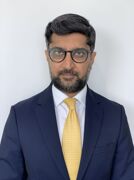 Kartik Patel attended Chislehurst & Sidcup Grammar School between 1996 and 2003, serving as School Captain. Kartik graduated from University of Warwick with a BSc (Hons) degree in Economics.
Kartik Patel attended Chislehurst & Sidcup Grammar School between 1996 and 2003, serving as School Captain. Kartik graduated from University of Warwick with a BSc (Hons) degree in Economics.
He commenced his career in the Mergers & Acquisitions division of HSBC Investment Bank relocating to Riyadh, KSA where he predominantly advised on numerous landmark corporate finance transactions with an aggregate value exceeding US$ 10 billion as Director, HSBC Saudi Arabia.
Subsequently, he was head hunted to establish and lead the Alternative Investments department at Ashmore, Saudi Arabia. He is currently a Portfolio Manager for a variety of funds across Education, Healthcare and Consumer sectors, serves on the Boards of portfolio companies and as an Independent Valuation & Investment Product Committee member at the largest MENA venture capital firm.
Dr Simon Desbruslais (Trumpet Soloist, Author and Musicologist)
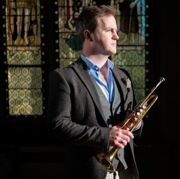 Simon Desbruslais continued his education at King’s College London and the Royal College of Music, winning numerous prizes and scholarships. He was subsequently a private student of Eric Aubier in the Conservatoire à Rayonnement Régional de Rueil-Malmaison. Keen to expand on the relationship between performance and musicology, Simon holds a doctorate from Christ Church, Oxford.
Simon Desbruslais continued his education at King’s College London and the Royal College of Music, winning numerous prizes and scholarships. He was subsequently a private student of Eric Aubier in the Conservatoire à Rayonnement Régional de Rueil-Malmaison. Keen to expand on the relationship between performance and musicology, Simon holds a doctorate from Christ Church, Oxford.
A crucial element of Simon’s career involves working with composers to create and champion new works involving the trumpet. In performance, he has an international profile which includes critically-acclaimed recordings. He has performed concert tours and live on BBC 1 television, BBC Radio 3 & 4 and German Radio SWR2 to millions of viewers and listeners worldwide.
He is author of The Music and Music Theory of Paul Hindemith (Boydell & Brewer), and was the first British scholar to publish in the Russian Journal of Music Theory.
Simon is Lecturer in Music at the University of Hull, where he is also Director of Performance.
Tom March (Creative Executive, Music Industry)
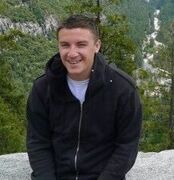 After leaving Chislehurst and Sidcup Grammar School Tom carved himself a successful career in the music industry.
After leaving Chislehurst and Sidcup Grammar School Tom carved himself a successful career in the music industry.
Tom joined UMG U.K in 2006 as a Junior Product Manager of Island Records, rising through the ranks to Marketing Manager, working on campaigns for Queen, Paul Weller, Jessie J, Florence and the Machines to name a few. Tom then moved across as General Manager of Virgin EMI.
At 31, Tom became one of the youngest General Managers in the UK music business. In May 2016 Tom March and Ben Mortimer were named as Co-presidents of Polydor Records.
Andrew Barrow (Triple Paralympian)
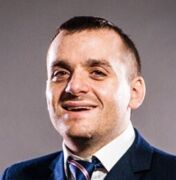 Andy Barrow was always a keen sportsman, playing rugby and cricket throughout his school days at Chislehurst and Sidcup Grammar School before going on to study Leisure and Tourism at Orpington College. In 1997, playing his first season of senior Rugby for Charlton Park RFC, Andy suffered a spinal-cord injury that left him paralysed from the chest down, with limited use of his hands. He was just 17 years old.
Andy Barrow was always a keen sportsman, playing rugby and cricket throughout his school days at Chislehurst and Sidcup Grammar School before going on to study Leisure and Tourism at Orpington College. In 1997, playing his first season of senior Rugby for Charlton Park RFC, Andy suffered a spinal-cord injury that left him paralysed from the chest down, with limited use of his hands. He was just 17 years old.
Following this catastrophic, life-changing injury and many hard months of rehabilitation, his life was transformed again when he discovered wheelchair rugby – also known as “Murderball” – and joined the London Wheelchair Rugby club.
Andy was selected to train with the Great Britain squad in 1999, and narrowly missed out on a place at the Sydney Paralympics. Vowing never to miss a major tournament again, he dedicated himself to the life of a full-time athlete, and made his international début at the Wheelchair Rugby World Championships in Gothenburg, Sweden in 2002.
His wheelchair rugby career encompassed three Paralympic Games (Athens 2004, Beijing 2008 and London 2012) three World Championships, and five European Championships, where he was part of the record-breaking team that won three gold medals in a row. He captained Great Britain from 2005 to 2010, and led the team out at the 2008 Beijing Paralympics – one of his proudest moments. He also played for San Diego in the US league.
The London 2012 Olympic and Paralympic Games was the greatest sporting event in Great Britain’s history, and the perfect opportunity for Andy to end his career on a high. He took the decision to make this his final tournament, following well over 100 appearances for GB.
Since retiring, Andy has worked as an athlete mentor for the Dame Kelly Holmes Trust, created his own successful mentoring projects and now coaches current Great Britain athletes through their public appearances. He also helped introduce the Athlete Inspiration Programme to schools in Greenwich to help keep the momentum following the success of London 2012 and encourage children to stay physically active.
He has developed a project with Chaucer Insurance to increase confidence and opportunities for children with learning difficulties in London and Kent.
One of the Shaw Trust Power 100, which annually lists the 100 most influential disabled people in the UK, Andy remains a leader, using his status and experience to make the world a more equitable place for disabled people travelling hopefully but often battling the odds in an effort to arrive.
Andy has also expanded his work internationally. In March 2017 he visited Japan to spread the word about disability sport and wheelchair rugby ahead of the Olympic and Paralympic Games in Tokyo in 2020 at a British Chamber of Commerce event.
Andy is an experienced ambassador who has represented charities including Team London, Right To Play and Laureus. He helped the newly formed Singapore wheelchair rugby team and gave a demonstration of the game in Hong Kong alongside his ambassadorial role at the Hong Kong 7s tournament.
Andy is also an elected Director of GB Wheelchair Rugby and a Director for volunteer charity Imago.
His is also currently an Accessibility Consultant for Southeastern Railways.
Kevin McKenna (Member of Parliament)
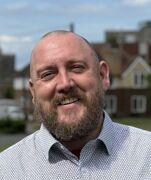 Kevin McKenna studied microbiology at the University of Warwick and later qualified as a registered nurse in the 1990s at the Nightingale Institute at King's College London. Kevin worked in the NHS as a frontline nurse in critical care in a number of London hospitals including University College London Hospitals NHS Foundation Trust and later in strategy on nationwide NHS programmes at NHS England. Kevin became a Darzi Fellow in clinical leadership in 2015.
Kevin McKenna studied microbiology at the University of Warwick and later qualified as a registered nurse in the 1990s at the Nightingale Institute at King's College London. Kevin worked in the NHS as a frontline nurse in critical care in a number of London hospitals including University College London Hospitals NHS Foundation Trust and later in strategy on nationwide NHS programmes at NHS England. Kevin became a Darzi Fellow in clinical leadership in 2015.
During the Covid-19 pandemic, McKenna worked as a matron at NHS Nightingale Hospital London.
Kevin is a British Labour Party politician and was elected as the Member of Parliament for Sittingbourne and Sheppey in 2024.
He was also selected to stand in Bexley and Bromley at the 2024 London Assembly election, losing out to the incumbent Conservative Party where he reduced the Conservative majority at the election by over 10,000 votes.
Samantha Smith (Leading Commercial Investor)
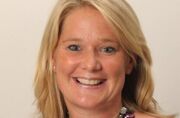 Samantha left Chislehurst and Sidcup Grammar School in 1992 and went on to study Economics and Accounting at the University of Bristol. After qualifying as a chartered accountant at KPMG in 1998 she joined JM Finn, a City broker, to help establish its corporate finance team. Samantha founded Finncap Limited in August of 2007 and serves as Chief Executive Officer and Managing Director. Samantha won The National Business Woman of the Future Award in 2009.
Samantha left Chislehurst and Sidcup Grammar School in 1992 and went on to study Economics and Accounting at the University of Bristol. After qualifying as a chartered accountant at KPMG in 1998 she joined JM Finn, a City broker, to help establish its corporate finance team. Samantha founded Finncap Limited in August of 2007 and serves as Chief Executive Officer and Managing Director. Samantha won The National Business Woman of the Future Award in 2009.
Graeme Hughes (Artist, Printmaker & Educator)
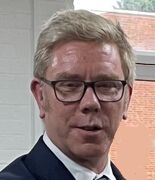 After leaving Chis and Sid in 1991 Graeme gained a BA Honours Degree from Central St Martins School of Art and from 1995 Graeme worked as a graphic designer in the art and music industry for ten years.
After leaving Chis and Sid in 1991 Graeme gained a BA Honours Degree from Central St Martins School of Art and from 1995 Graeme worked as a graphic designer in the art and music industry for ten years.
Graeme went onto study a Master’s degree in fine art at the Royal College of Art (RCA). Following the award of his MA Graeme set up a fine art publishing business and editioning studio with peers, collaborating with artists, musicians, and publishers in originating limited edition prints.
In 2011 Graeme was invited to teach in the Royal Academy Schools where he developed his own artwork in drawing, printmaking and sculpture as a fine art research fellow for two years.
Graeme began teaching fine art at the University of Oxford in 2013, being commissioned by them to design a new printmaking studio for The Ruskin School of Art, for which he received an award from the university for an ‘outstanding contribution to teaching’ and a funding grant to research the relationship between tools, creativity and knowledge.
Graeme continues to work at the Ruskin School of Art as Senior Ruskin Tutor of Printmaking and as an Artist. He teaches both the undergraduate and graduate programmes. He also designs and leads courses for the Opportunity Oxford & UNIQ programs at the university.
Andrew Mace (Senior Government Relations Officer)
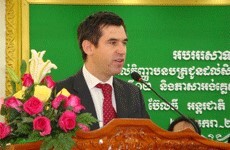 After leaving school Andrew graduated with a MA in English from Emmanuel College, Cambridge. He has held various positions within the Foreign and Commonwealth Office where he worked particularly on policy towards countries affected by conflict, the United Nations, and the European Union. He served overseas in the UK Representation to the EU and at the British Embassies in Denmark and Liberia. From 2008-11 he was based in Phnom Penh as British Ambassador to Cambodia. In 2014 Andrew joined the Bill & Melinda Gates Foundation as the Senior Government Relations Officer currently working with the government to tackle the world’s toughest problems.
After leaving school Andrew graduated with a MA in English from Emmanuel College, Cambridge. He has held various positions within the Foreign and Commonwealth Office where he worked particularly on policy towards countries affected by conflict, the United Nations, and the European Union. He served overseas in the UK Representation to the EU and at the British Embassies in Denmark and Liberia. From 2008-11 he was based in Phnom Penh as British Ambassador to Cambodia. In 2014 Andrew joined the Bill & Melinda Gates Foundation as the Senior Government Relations Officer currently working with the government to tackle the world’s toughest problems.
Prabh Mokha (Teacher and Author)
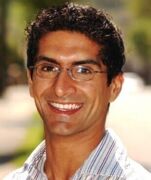 Prabh left Chislehurst and Sidcup Grammar School in 1992 and went on to read Law at university. He qualified as a Chartered Accountant in both the UK and later New Zealand. It was there he gained his passion for writing young adult fantasy novels which include, The Last Sanctuary, The Fall of Refuge and The Wrath of Winter.
Prabh left Chislehurst and Sidcup Grammar School in 1992 and went on to read Law at university. He qualified as a Chartered Accountant in both the UK and later New Zealand. It was there he gained his passion for writing young adult fantasy novels which include, The Last Sanctuary, The Fall of Refuge and The Wrath of Winter.
A move into education enabled more writing time. Relocating into a remote area of New Zealand helped feed his inspiration for the epic format of his tales.
Prabh became Assistant Principal at the local high school and is involved in numerous community projects promoting literature and education. He founded Tangerine Publications, a company committed to supporting New Zealand authors reach the world stage. Prabh has three daughters. His eldest (Katja Mokha) had won numerous writing awards and two independent publications before reaching her teenage years.
Stephen Harrison (Olympic Athlete)
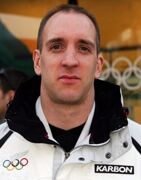 Stephen was born in Auckland, New Zealand and later emigrated to England attending Chislehurst and Sidcup Grammar School. During his school years he was a very talented multi-eventer in athletics and an excellent rugby player, playing in the school’s 1st XV Rugby team and representing the school in the Javelin and in Athletics.. After leaving school in 1991 he joined Mississippi State University to study Business and Athletics.
Stephen was born in Auckland, New Zealand and later emigrated to England attending Chislehurst and Sidcup Grammar School. During his school years he was a very talented multi-eventer in athletics and an excellent rugby player, playing in the school’s 1st XV Rugby team and representing the school in the Javelin and in Athletics.. After leaving school in 1991 he joined Mississippi State University to study Business and Athletics.
Between 1995 and 1998 he is recorded on World Athletics as competing in the Javelin, he placed 8th at the AAA Championships, Birmingham 1998 with a score of 926 and throw of 67.89m, placing eighth behind Steve Backley. He threw a personal best of 75.32m and scored 1035 in Tallin, Estonia, in 1995 placing sixth.
After returning to New Zealand Stephen starting competing in bobsleigh in 2000 and became a member of the New Zealand Bobsleigh Team. In 2000 the NZ Bobsleigh Team produced a top-10 performance in the Europe Cup, Austria to strengthen their claim for a spot at the next Winter Olympics. The quartet of Steve Harrison, Alan Henderson, Mark Edmond and Angus Ross clocked 1m 46.74s, 1.53s behind winners Germany. The team gaining 37 Europe Cup points, comfortably clear of the 30 needed for Olympic selection.
Stephen became a double Olympian, being a member of the New Zealand Four Man Bobsleigh Team that competed at the Winter Olympics at Salt Lake City in 2002, and at the games held in Turin in 2006 (also known as the Torino 2006 games).
As of 2009 Stephen continued to compete with the New Zealand Men’s Bobsleigh Team.
Dr Boyd Ghosh (Consultant Neurologist and Research Lead)
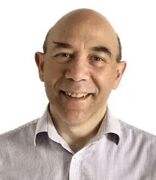 Dr Ghosh is a consultant neurologist at University Hospital Southampton (UHS) and a trustee of the PSP Association (PSPA). He attended Chis and Sid from 1982 to 1989 and went on to study Natural Sciences at University of Cambridge.
Dr Ghosh is a consultant neurologist at University Hospital Southampton (UHS) and a trustee of the PSP Association (PSPA). He attended Chis and Sid from 1982 to 1989 and went on to study Natural Sciences at University of Cambridge.
He runs a specialist clinic which treats approximately 140 people with Progressive Supranuclear Palsy (PSP) and Corticobasal Degeneration (CBD) across the south of England. These are rare and incurable conditions that affect around 10,000 people in the UK.
He is also the holder of a UHS Research Leaders Programme award. His research focuses on rare neurological diseases that share some of the signs and symptoms of Parkinson’s disease.
As the divisional research lead at UHS Dr Boyd Ghosh appeared in the programme ‘Inside Neurology: Our Unique Brain’ to promote greater understanding of the two neurological diseases. The programme was produced by ITN Business and The Brain Charity. Both PSP and CBD are caused by increasing numbers of brain cells becoming damaged over time. This can lead to problems with balance, movement, vision, speech and swallowing.
These are complex conditions which can be difficult to diagnose. It can take up to three years to get a diagnosis, at which point the patient may already have a lower quality of life. Around 60% of those living with either disease may be misdiagnosed with other conditions, including Parkinson’s, stroke and depression.
UHS is leading research to help provide a better understand neurological conditions. This includes a major international study in which the first UK patient has received a pioneering new treatment for PSP. The research, led by Dr Ghosh, targets the root cause of the condition. This could slow PSP’s effects.
Dr Ghosh has also received funding from the PSPA (PSA Association) to assess the benefits of multidisciplinary teams within specialist clinics. This is part of ongoing work to establish clinical guidelines for people with PSP and CBD.
‘Inside Neurology: Our Unique Brain’ is available to watch on the ITN Hub.
James Griffiths (Film Director and Producer)
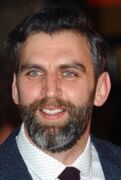 James Griffiths was educated at Chis and Sid between 1982 and 1989, studying Art, English Literature and Geography at A level. He then completed a foundation course at the Camberwell School of Art before gaining a first-class honours degree at the University of Bath.
James Griffiths was educated at Chis and Sid between 1982 and 1989, studying Art, English Literature and Geography at A level. He then completed a foundation course at the Camberwell School of Art before gaining a first-class honours degree at the University of Bath.
James began his career directing music videos, and later began directing television in the UK. Griffiths directed every episode of Free Agents and the first season of Episodes.
He served as a producer on A Million Little Things, Black-ish, and its Freeform spinoff, Grown-ish, and directed and executive produced the ABC series, Stumptown.
He also executive produced The Mayor and directed the pilot episode of Cooper Barrett's Guide to Surviving Life and Up All Night.
James is known for his work in the comedy genre, with a particular inclination towards heart-warming romance and sports-themed narratives. He directed his first feature film Cuban Fury in 2014, a delightful blend of comedy, romance, and sport. Griffiths' directorial style is characterized by his ability to infuse humour with genuine emotion, creating films that resonate with audiences on a personal level.
In Cuban Fury, he showcases his adeptness at blending physical comedy with genuine heartfelt moments, capturing the essence of the protagonist's journey to win the heart of his love interest through salsa dancing. The film's light hearted tone, witty dialogue, and infectious energy reflect Griffiths' skill in crafting endearing narratives that appeal to a wide audience. One of Griffiths' recurring themes is the celebration of human resilience and the triumph of the underdog. His films often revolve around characters who overcome personal obstacles and societal expectations, resonating with viewers through their relatable struggles and eventual triumphs.
Previously, his 2006 short film The One and Only Herb McGwyer Plays Wallis Island premiered at the Toronto Shorts Festival, earning the Best Short Film award at the Edinburgh International Film Festival and a BAFTA nomination.
James renewed his contract with ABC Studios for another two years to 2021, including a development contract with his own production company, Fee Fi Fo Films.
In 2025, Griffiths released The Ballad of Wallis Island, a feature film adaptation of The One and Only Herb McGwyer Plays Wallis Island, which is about an eccentric lottery winner who lives alone on a remote island tries to make his fantasies come true by getting his favourite musicians to perform at his home.
The film stars Tim Key, Tom Basden, and Carey Mulligan and premiered 30th May 2025.
Annabel Kantaria (Prize-winning Author)
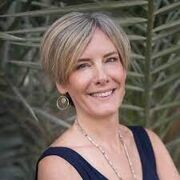 Annabel Kantaria (nee Martin) attended Chis and Sid between 1982 and 1989, before studying Psychology at University of Warwick. Annabel graduated with BSc Hons and then spent six years working in publishing in London, first at Franklin Watts and then at Dorling Kindersley. She has lived in Dubai since 1998, working as a freelance journalist and radio producer before becoming the editor of the region’s leading women’s magazine, Emirates Woman.
Annabel Kantaria (nee Martin) attended Chis and Sid between 1982 and 1989, before studying Psychology at University of Warwick. Annabel graduated with BSc Hons and then spent six years working in publishing in London, first at Franklin Watts and then at Dorling Kindersley. She has lived in Dubai since 1998, working as a freelance journalist and radio producer before becoming the editor of the region’s leading women’s magazine, Emirates Woman.
In 2013, Annabel won the inaugural Montegrappa Prize for First Fiction at the Emirates Airline Festival of Literature. An initial three-book deal with Harlequin MIRA led to a further three-book contract with HQ stories at Harper Collins. Annabel also writes under the pseudonym Anna Kent. She has written five domestic noir psychological thrillers published by HQ Stories (Harper Collins UK).
Annabel has written prolifically for publications in the UK and across the Middle East and currently juggles her fiction-writing with her work for The Telegraph as an ‘Expat’ blogger.
Simon Kövesi (Professor of English Literature & Head of English and Modern Languages, Oxford Brookes University)
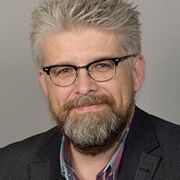 Simon was born and brought up in Sidcup. He was the first in his family to go to university. Studying English Literature enlightened his passion for Romantic poetry and working class literature. He joined the English Department at Oxford Brookes University in 2001, having previously studies and/or taught at the universities of Glasgow, Dundee, Nottingham Trent and North Carolina at Chapel Hill (USA).
Simon was born and brought up in Sidcup. He was the first in his family to go to university. Studying English Literature enlightened his passion for Romantic poetry and working class literature. He joined the English Department at Oxford Brookes University in 2001, having previously studies and/or taught at the universities of Glasgow, Dundee, Nottingham Trent and North Carolina at Chapel Hill (USA).
Since then, the highlights of his published work include a monograph on contemporary Scottish novelist James Kelman, a campaign to challenge the private copyright to John Clare’s work in two collections of his poetry and associated publication, and his ongoing editorship of the John Clare Society Journal. Simon also appeared in Andrew Kötting’s feature film By Our Selves (2015), talking about Clare. Simon as taught and lectured on a range of literature from Chaucer to Mills and Boon Romances. He specialises in Romantic-period literary culture, working-class literature from 1800 to the present, contemporary Scottish literature, and the relationship between literature and the natural world.
Matthew Brimson (Professional Cricketer: Leicestershire and Kent)
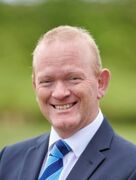 Matthew was a slow left arm orthodox spin bowler, he played first-class cricket for Leicestershire.
Matthew was a slow left arm orthodox spin bowler, he played first-class cricket for Leicestershire.
An outstanding cricket player at school, in August 1988 he was selected to play for England U17s playing a test match against Sri Lanka at Canterbury. He played briefly for the Kent Second Eleven (1990–1991) and studied Geography at Durham University from 1990, where he represented the university side.
He made 66 first-class and 45 List A appearances for Leicestershire, including playing on the 1996 County Championship winning team. His best bowling figures were 5 wickets from 12 balls. He retired from cricket and went into teaching in 2000 becoming Head of Geography and Hockey as well as Cricket Coach at West Buckland School.
Matthew continues to teach at West Buckland School where he has subsequently assumed the responsibilities of Head of Careers, Head of Sixth Form and also Deputy Head Academic.
Nicholas Detnon (Brit-hop Producer, Manager and Recording Studio Owner)
 Nick "Cage" Denton is a London-based music manager and producer, best known for managing UK rap/grime superstar Dizzee Rascal MBE and owning the renowned music production studio Belly of the Beast.
Nick "Cage" Denton is a London-based music manager and producer, best known for managing UK rap/grime superstar Dizzee Rascal MBE and owning the renowned music production studio Belly of the Beast.
Nick’s writing credits include the hits Fix Up, Look Sharp, Dance wiv Me, Holiday, You’ve got the Dirtee Lov (Ft Florence + The Machine), he also composed Live, Large n’ in Charge and Dirtee Disco.
Winning a Mercury prize at 19 could have been terminal for Dizzee Rascal instead of crumbling under the burden of expectation he and producer Nick Denton thrived, Dizzee was expertly and intuitively marshalled by producer, manager and father figure Cage, turning himself into black British music's powerhouse brand. The fourth Dizzee album, Tongue n' Cheek (the first on his and Cage's Dirtee Stank label), proved he could do virtually anything musically, and the pair's carefree sonic abandon was rewarded with platinum sales and four No 1 singles. The album Tongue n Cheek won the Mastercard British Album of the Year at the Brit Awards in 2010 and placed ‘Team Dizzee Rascal’ at No 28 in The Guardian’s Music Power 100 in May 2011.
He has also worked with Jorja Smith (Blue Lights) Jessie J (Wild) Kneecap (Harrow Road) in various capacities such as writing & arrangement, management, executive producer, composer, sound mixer, sound engineer, recording engineer, A&R and photography.
Nick Denton, often nicknamed "Cage," is a prominent figure in the UK music industry. He is the owner of Belly of the Beast, a high-end music production studio in South London, which became the UK's first studio to install a Neve 8424 analogue mixing console. This studio is known for working with major UK artists, including Dizzee Rascal and Arctic Monkeys.
As a manager, Nick has built a reputation for his role in artist management and music production. He is also deeply engaged in the technical side of music recording, curating an impressive array of outboard audio gear and creating a user-friendly environment for artists and engineers. He continues to further his studio expertise, contributing both in studio management and in artist development within the UK rap and grime scenes.
Dr Nicola Rehling (Published Author and Academic)
(With the prestigious accolade of not one but two mentions in Past Purple – A History of Chislehurst and Sidcup Grammar School)
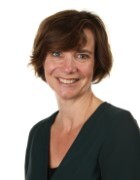 After leaving Chislehurst and Sidcup Grammar School, Nicola went on to gain a BA from Emmanuel College, Cambridge, an MA from the University of Sussex and a PhD from Aristotle University of Thessaloniki, Greece, where she lectured in film and literature for 15 years.
After leaving Chislehurst and Sidcup Grammar School, Nicola went on to gain a BA from Emmanuel College, Cambridge, an MA from the University of Sussex and a PhD from Aristotle University of Thessaloniki, Greece, where she lectured in film and literature for 15 years.
Nicola has published widely in the field of popular film and media, including her book Extra-Ordinary Men: White Heterosexual Masculinity in Contemporary Hollywood Cinema (Lexington Books 2009). Nicola returned to Britain in 2013 and has come full circle, having taken up the position of Head of English at Chis and Sid in June 2017. Nicola is currently Head of Sixth Form at Chis and Sid.
Steve Hillier (British Songwriter, DJ and Record Producer)
 Steve is a songwriter and record producer who has worked with a diverse range of artists, from Keane to Gary Numan. He has written fifteen top 40 singles, including nine hits by his platinum-selling band Dubstar. Steve is also a journalist and music technology expert, writing for Future Music magazine and many high profile websites, including BBC worldwide. Steve is also a regular tutor at Point Blank Online Music School.
Steve is a songwriter and record producer who has worked with a diverse range of artists, from Keane to Gary Numan. He has written fifteen top 40 singles, including nine hits by his platinum-selling band Dubstar. Steve is also a journalist and music technology expert, writing for Future Music magazine and many high profile websites, including BBC worldwide. Steve is also a regular tutor at Point Blank Online Music School.
Steve was born in Southampton but grew up in South London where he attended Chislehurst and Sidcup Grammar School. He had his first article as a journalist published at the age of twelve. He started DJing at the age of fifteen, playing alternative music in pubs and clubs in Bexley and surrounding areas including many events at Crayford Town Hall. On leaving Chislehurst and Sidcup Grammar School Steve moved to Newcastle upon Tyne where he DJed and promoted nightclub events. It was during this period that he met Chris Wilkie and Sarah Blackwood and formed Dubstar.
Professor Karl Glazebrook (Leading Astronomer)
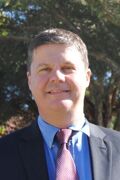 Professor Karl Glazebrook is an astronomer known for his work on galaxy formation. His research interests include observational cosmology and the formation and evolutionary history of galaxies. After leaving Chislehurst and Sidcup Grammar School he went on to study at the University of Cambridge and the University of Edinburgh (Ph.D. 1992). He held post-doctoral appointments at Durham University and the University of Cambridge before moving to Australia. Karl is now a Professor in the Centre for Astrophysics and Supercomputing at the Swinburne University of Technology.
Professor Karl Glazebrook is an astronomer known for his work on galaxy formation. His research interests include observational cosmology and the formation and evolutionary history of galaxies. After leaving Chislehurst and Sidcup Grammar School he went on to study at the University of Cambridge and the University of Edinburgh (Ph.D. 1992). He held post-doctoral appointments at Durham University and the University of Cambridge before moving to Australia. Karl is now a Professor in the Centre for Astrophysics and Supercomputing at the Swinburne University of Technology.
Peter Hambly (Animal Welfare Expert and Campaigner)
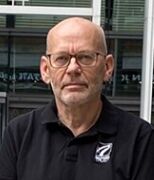 Peter Hambly is a British animal welfare expert and campaigner on wildlife and environmental issues arising from the impact of climate change.
Peter Hambly is a British animal welfare expert and campaigner on wildlife and environmental issues arising from the impact of climate change.
He was educated at Chis and Sid between 1976 and 1983 and then studied Economics and Social Studies at University of Manchester.
Peter was Carbon Trust's first marketing director at its creation in 2001 and served in that role for nearly two decades until July 2020. Presently he is Chief Executive of Badger Trust, leading the campaign against the badger cull since December 2021. He is a national commentator on issues around the badger cull - appearing on radio, TV and regularly quoted in national news outlets.
Peter is a member of Wildlife and Countryside Link and serves as a member of its bovine tuberculosis group and wildlife crime group.
At Carbon Trust he created and launched the world's first carbon footprint label which is now featured on thousands of products. He also successfully rolled out the disbursement of £100 million of business loans for energy efficiency. Peter ran the first UK national business advertising campaign around reducing carbon emissions and taking action on climate change in 2004.
In 2007 Carbon Trust won the marketing campaign of the year for its elephant in the room campaign around business carbon footprints, as well as best Green website for its carbon label work.
At Badger Trust, Peter co-ordinated the campaign against the badger cull which has been killing badgers since 2013. Using scientific arguments and the co-authored report "Tackling bTB together" published in January 2024, this helped lay the basis for the Labour Party's 2024 manifesto promise in the UK General Election to end the badger cull. This they have pledged to do by 2029. Peter has restated that badgers are not a significant spreader of bTB to cattle - cattle to cattle are responsible for around 94% of the spread.
Alison Cork (Entrepreneur, Author and TV Presenter)
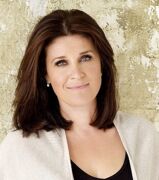 An English interiors expert, entrepreneur, author, and TV presenter. She is the founder and CEO of online brand alisonathome.com and founder of Make It Your Business.
An English interiors expert, entrepreneur, author, and TV presenter. She is the founder and CEO of online brand alisonathome.com and founder of Make It Your Business.
In 1992, Alison co-founded mail order publishing company Carnell Ltd with entrepreneur publisher John P Gommes. The company was subsequently floated on the London Stock Exchange in 1994. It published titles such as How To Talk To Your Cat and Vinegar, Honey and Lemon, Nature's Medicine Chest. The Government Auction Handbook sold 200,000 copies in the space of a few months. Alison's book Profit Through The Post, was voted Book of the Month by Mensa. From 1995 onwards, Alison wrote five books including The Streetwise Guide To Renovating Your Home and Special Occasions. Published in 2000, it included various recipes and creative ideas. Alison launched two furniture collections for Made.com. In September 2012, Alison launched an online furniture and accessories business, Alison at Home. Alison has also launched several bathroom collections for online bathroom retailer Victorian Plumbing Alison has also written weekly interiors column for the London Evening Standard since 2002.
Rick Everitt (Author and Politician)
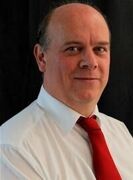 After graduating from Reading University with an honours degree in Politics, Rick worked as a sports editor at the Mercury. He then joined the staff at Charlton Athletic where he spent 14 years in various roles. He was a Labour candidate for the Old Bexley and Sidcup division and since 2011 he has been a member of Ramsgate Town Council and Thanet District Council where he is the cabinet member for finance and estates.
After graduating from Reading University with an honours degree in Politics, Rick worked as a sports editor at the Mercury. He then joined the staff at Charlton Athletic where he spent 14 years in various roles. He was a Labour candidate for the Old Bexley and Sidcup division and since 2011 he has been a member of Ramsgate Town Council and Thanet District Council where he is the cabinet member for finance and estates.
Rick published a second edition of his Charlton classic ‘Battle for the Valley’ which tells the story of how the Valley Party got Charlton back to its home as well as looking at the earlier history of the club. His first edition was published without the happy ending and that has now been rectified.
Nigel Warburton (Leading Philosopher)
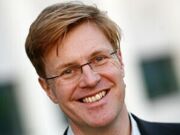 After leaving Chislehurst and Sidcup Grammar School Nigel received a BA from the University of Bristol and a Ph.D. from Darwin College, Cambridge. He is best known as a populariser of philosophy, having written a number of books in the genre, but he has also written academic works in aesthetics and applied ethics. He regulary teaches courses on philosophy and art at the Tate Modern and writes a monthly column ‘Everyday Philosophy’ for Prospect Magazine. He runs the philosophy webblog Virtual Philosopher and a podcast series, Philosophy Bites, which includes interviews with top philosophers on a range of subjects.
After leaving Chislehurst and Sidcup Grammar School Nigel received a BA from the University of Bristol and a Ph.D. from Darwin College, Cambridge. He is best known as a populariser of philosophy, having written a number of books in the genre, but he has also written academic works in aesthetics and applied ethics. He regulary teaches courses on philosophy and art at the Tate Modern and writes a monthly column ‘Everyday Philosophy’ for Prospect Magazine. He runs the philosophy webblog Virtual Philosopher and a podcast series, Philosophy Bites, which includes interviews with top philosophers on a range of subjects.
Professor Richard Lock (Leading Scientist)
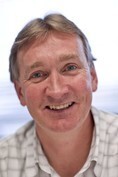 Professor Lock attended Chislehurst and Sidcup Grammar School 1971-1979, then on to Swansea University BSc (Hons) and PhD London. He has attained international reputation in the cancer-related fields of cell cycle control, drug resistance and mechanisms of cell programmed death. Professor Lock was recruited as Head of CCIA’s Leukaemia Biology Programme in 1998 where he has successfully developed a laboratory model for the growth of human Lymphoblastic Leukaemia cells.
Professor Lock attended Chislehurst and Sidcup Grammar School 1971-1979, then on to Swansea University BSc (Hons) and PhD London. He has attained international reputation in the cancer-related fields of cell cycle control, drug resistance and mechanisms of cell programmed death. Professor Lock was recruited as Head of CCIA’s Leukaemia Biology Programme in 1998 where he has successfully developed a laboratory model for the growth of human Lymphoblastic Leukaemia cells.
Air Cmde David Best OBE (Test Pilot, Engineer and Entrepreneur)
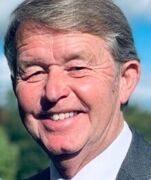 David Best was born in County Durham and moved to South East London at age 7. He attended Chislehurst and Sidcup Grammar School where he became Head of School and he then studied physics at Bristol University, graduating in 1982. David was a member of Bristol University Air Squadron before becoming an RAF fighter pilot. He was subsequently selected for test pilot training and attended the Empire Test Pilots' School in 1989. In 1993 he was awarded a Queen's Commendation for Valuable Service in the Air.
David Best was born in County Durham and moved to South East London at age 7. He attended Chislehurst and Sidcup Grammar School where he became Head of School and he then studied physics at Bristol University, graduating in 1982. David was a member of Bristol University Air Squadron before becoming an RAF fighter pilot. He was subsequently selected for test pilot training and attended the Empire Test Pilots' School in 1989. In 1993 he was awarded a Queen's Commendation for Valuable Service in the Air.
David was commander of the Empire Test Pilots’ School from 1998 to 2001 and was UK MoD Chief Test Pilot from 2004 to 2007. In 2010, he was appointed as NATO's Director of Air Operations and Plans in Kabul, Afghanistan.
David became a co-founder, Chief Operating Officer and executive director of Nova Systems International. He was also the company's Chief Test Pilot from 2012 to 2021. In 2022, he was awarded the RP Alston Medal from the Royal Aeronautical Society. He was cited for his “outstanding career contributions to test flying, operational military leadership and industrial entrepreneurialism including the exploitation of novel aerospace technologies in the fields of flight control, unmanned aerial systems (UAS) and Intelligence, Surveillance and Reconnaissance (ISR).”
David is a Chartered Engineer. In 2022 he founded SkyBoss Aerospace Ltd. David is also an elected Fellow of both the Royal Aeronautical Society and the Society of Experimental Test Pilots. David was appointed an Officer of the Most Excellent Order of the British Empire (OBE) in 2001.
The Rt Revd Dr Alan Winton (Diocesan Bishop)
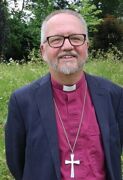 Bishop Alan attended Chislehurst and Sidcup Grammar School 1970-1977, he is remembered as an excellent bowler. His education continued at Sheffield University where he achieved BA Hons in Biblical Studies, and then a doctorate. Subsequently he trained for the ministry at Lincoln Theological College.
Bishop Alan attended Chislehurst and Sidcup Grammar School 1970-1977, he is remembered as an excellent bowler. His education continued at Sheffield University where he achieved BA Hons in Biblical Studies, and then a doctorate. Subsequently he trained for the ministry at Lincoln Theological College.
First ordained as a priest in 1992, Bishop Alan has served the church in London, Hertfordshire and Norfolk.
In 2009, he was appointed Bishop of Thetford in the Diocese of Norwich. He was consecrated as Bishop by Rowan Williams, Archbishop of Canterbury at St Paul's Cathedral. After 14 years of service Bishop Alan retired in 2023 having made a significant contribution to many areas of Diocesan life, including the selection and training of clergy, the church schools, and the parishes in his care
Nicholas Low (Distinguished Diplomat)
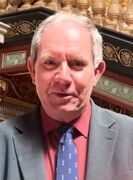 Nick Low studied History, Latin and Greek at A Level, winning the school subject prizes for Greek (twice) and for Latin.
Nick Low studied History, Latin and Greek at A Level, winning the school subject prizes for Greek (twice) and for Latin.
He won a ‘common place’ at Christ's College, University of Cambridge in 1977. He graduated with first class honours in Classics and Ancient History and holds a Masters in Ancient History. He is also a graduate of the Police Staff College Bramshill.
His curriculum vitae includes a stint in the National Health Service as an engineer and ten years in the Metropolitan Police Service, serving in both uniform and detective branches, before joining the Foreign and Commonwealth Office in 1993. In 1994 he was seconded top the court of HRH Crown Prince Sidi Mohammed. He has trained in many languages including Spanish, Portuguese and French.
From 1999 to 2003 he was based in Brazil as the Head of Trade, Investment, Trade Policy & Economics. In 2004 he moved to Algiers as Head of Mission and then from 2007 to 2010 was made Head of Nuclear Issues at the Counter Proliferation Department. Nick was Deputy High Commissioner to Bangladesh between 2010 and 2014 before returning to London as Acting Head of Crisis Management at the FCO 2014 to 2015. From 2015 to 2019 he headed up China Regional Network & Sustainable Urbanisation in Beijing. Nick was then Deputy High Commissioner to East and Northeast India based in Kolkata from 2019 to 2023.
Nick has been with the Foreign, Commonwealth & Development Office (FCDO) India and Indian Ocean Directorate since 2023. He counsels on UK relations with this critically important region – including Bangladesh, Bhutan, India, Maldives, and Sri Lanka; as well as on development programming across the wider Indo-Pacific region.
In January 2025 Nick was appointed British High Commissioner to the Republic of Maldives.
Nick is also a Visiting Fellow at China & Emerging Economies Centre, University of Northampton, a role he took up in 2020.
Lieutenant General Richard Applegate CB OBE (Military Strategist)
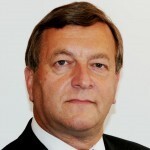 After leaving school Richard joined the British Army in 1973 holding various military ranks throughout his career, serving in Bosnia and Kosovo. During 2007 he was responsible for defence supply operations in Iraq and Afghanistan. Richard became Defence Career Partner to international companies in preparation for the post of Chief of Defence for the MOD in 2009. Richard was awarded the CB (Companion of the Order of the Bath) in 2010 and the OBE in 1996. He left the army in 2010 and is now a director of Eagle Strategic Consulting Ltd.
After leaving school Richard joined the British Army in 1973 holding various military ranks throughout his career, serving in Bosnia and Kosovo. During 2007 he was responsible for defence supply operations in Iraq and Afghanistan. Richard became Defence Career Partner to international companies in preparation for the post of Chief of Defence for the MOD in 2009. Richard was awarded the CB (Companion of the Order of the Bath) in 2010 and the OBE in 1996. He left the army in 2010 and is now a director of Eagle Strategic Consulting Ltd.
Matthew Collings (Art Critic, Presenter and Writer)
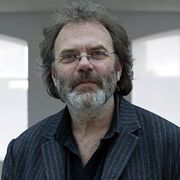 Matthew Collings studied at Chis and Sid between 1967 and 1967 before transferring to The Sloan School, Chelsea. He then studied at Byam Shaw School of Art, and Goldsmiths College in London.
Matthew Collings studied at Chis and Sid between 1967 and 1967 before transferring to The Sloan School, Chelsea. He then studied at Byam Shaw School of Art, and Goldsmiths College in London.
Matthew began his career working at Artscribe first in the production department in 1979 and later taking over as editor, filling that role from 1983 to 1987, bringing international relevance to the magazine. In 1987 he received a Turner Prize commendation for his work on Artscribe. He later moved into television working as a producer and presenter on the BBC The Late Show from 1989 to 1995. In the early 1990s he brought Martin Kippenberger into the BBC studios to create an installation, and he interviewed Georg Herold while this Cologne-based conceptual artist painted a large canvas with beluga caviar. He gave Jeff Koons his first sympathetic exposure on British TV, and Damien Hirst was also introduced for the first time to the UK TV audience by Collings.
He wrote and presented documentary films for the BBC on individual artists, such as Donald Judd, Georgia O'Keeffe and Willem de Kooning, as well as broader historical subjects such as Hitler's "Degenerate art" exhibition, art looted in the Second World War by Germany and Russia, Situationism, Spain's post-Franco art world and the rise of the Cologne art scene.
After leaving the BBC, Matthew wrote 'Blimey! From Bohemia to Britpop: The London Artworld from Francis Bacon to Damien Hirst,' which humorously chronicled the rise of the Young British Art (YBA) movement. Published in 1997 by 21, a new company founded by David Bowie, among a group of others, 'Blimey!' was described by Artforum magazine as “…one of the best-selling contemporary-art books ever." (Kate Bush on the YBA Sensation, Artforum, 2004) The article went on to say that Mathew "invented the perfect voice to complement YBA: He makes an impact without (crucially) ever appearing to try too hard." The following year, Matthew wrote and presented the Channel 4 TV series This is Modern Art, which won him a Bafta (2000) among other awards.
Matthew wrote and presented a Channel 4 series in 2003 about the "painterly" stream of Old Master painting, called Matt's Old Masters. A book by the same title accompanied the series. Further Channel 4 series included Impressionism: Revenge of the Nice (2004) and The Me Generations: Self Portraits, (2005). Between 1997 and 2005, Mathew presented the Channel 4 TV programme on the Turner Prize.
In 2007 he wrote and presented the Channel 4 TV series This is Civilisation.[ In 2009 he appeared on the BBC2 programme "School of Saatchi" a reality TV show for newly trained UK artists.
In October 2010, he wrote and presented a BBC2 series called Renaissance Revolution, in which he discussed three Renaissance paintings: Raphael's Madonna del Prato; Hieronymus Bosch's The Garden of Earthly Delights; and Piero della Francesca's The Baptism of Christ.[3] In 2014 he wrote and presented a 90-minute documentary for BBC4 on abstract art: The Rules of Abstraction considered early modernist beginnings by Paul Klee, Wassily Kandinsky, Hilma af Klint, and others, as well as contemporary continuities, ranging from Fiona Rae to El Anatsui. In the same year, Collings appeared in Frederick Wiseman's documentary, National Gallery composing and rehearsing a piece-to-camera on Turner's The Fighting Temeraire, for the documentary Turner's Thames, (2012), which Collings wrote and presented for BBC4.
Since 2015, he has been the regular art critic for the Evening Standard, replacing Brian Sewell, who died that year.
Mathew’s ongoing series of drawings of an “alternative art history,” begun in 2020, has been a commercial success, with many thousands sold on Instagram.
Morris Gleitzman (Children’s Author)
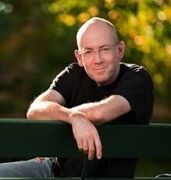 Morris Gleitzman was born in 1953 in Lincolnshire and moved to the South of England when he was aged two. At the age of 16 and after leaving Chislehurst and Sidcup Grammar School he emigrated to Australia with his family. Morris loved reading from a very early age and enrolled on a number of professional writing courses. After graduating from the University of Canberra he held various different positions from journalism to writing jokes on the back of cereal packets. During 1987, Morris was approached by a publisher who gave him the opportunity to convert a script into a novel. This resulted in his first book being published “The Other Facts of Life”. It was a huge success and Morris has since written numerous children’s books and has become a well-respected and popular children’s author.
Morris Gleitzman was born in 1953 in Lincolnshire and moved to the South of England when he was aged two. At the age of 16 and after leaving Chislehurst and Sidcup Grammar School he emigrated to Australia with his family. Morris loved reading from a very early age and enrolled on a number of professional writing courses. After graduating from the University of Canberra he held various different positions from journalism to writing jokes on the back of cereal packets. During 1987, Morris was approached by a publisher who gave him the opportunity to convert a script into a novel. This resulted in his first book being published “The Other Facts of Life”. It was a huge success and Morris has since written numerous children’s books and has become a well-respected and popular children’s author.
Nigel Williamson (Leading Journalist and Author)
 After leaving university Nigel worked as a reporter for Tribune Magazine before becoming editor in 1984. In 1987 Nigel was hired as the editor of the Labour Party’s member’s magazine “Labour Party News”. He also served as press officer to Neil Kinnock during the 1997 general election.
After leaving university Nigel worked as a reporter for Tribune Magazine before becoming editor in 1984. In 1987 Nigel was hired as the editor of the Labour Party’s member’s magazine “Labour Party News”. He also served as press officer to Neil Kinnock during the 1997 general election.
During 1997 Nigel joined The Times newspaper as a reporter and Whitehall correspondent. He also writes pop and world music articles for a variety of publications including Uncut and Songlines. Nigel has written a number of books about the classic songs of Neil Young, Bob Dylan and Led Zeppelin.
Graham Clinton (Professional Cricketer: Kent, Surrey and England)
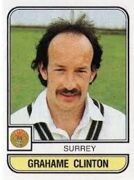
Grahame Clinton joined the Sixth Form at Chis and Sid having previously studied at Hurstmere School.
He is a former English cricketer. He was an opening batsman who played for Kent County Cricket Club from 1974-1978 and for Surrey County Cricket Club from 1979-1990, scoring over 13,000 first-class runs. Previously he played cricket for the English Schools Cricket Association and England Young Cricketers from 1970 to 1972.
With all partners, Grahame took part in 31 century opening partnerships, and 73 century stands when all wickets are considered. He scored over a thousand runs in his first season with Surrey, a feat he achieved on six other occasions: 1980, 1981, 1985, 1986, 1988 and 1990. His best seasons, when he averaged in the 40s, were 1984, 1985, 1988 and 1990, He was still scoring heavily as ever during his final season in 1990 with 1292 runs. His final first-class match was against his old county of Kent. He scored 57 in his only innings of the match.
Grahame also played 4 matches for the Zimbabwe-Rhodesia Cricket Team in the 1979/80 Currie Cup, a 4-day domestic first-class cricket series in South Africa.
After he retired Grahame became the coach of Surrey's Second XI in 1992, leading the side to the Second XI Championship in that year. He coached Surrey's First XI from 1994 to 1995 but left the county by mutual consent after "two ... seasons of unfulfilled promise". He was also a coach at Kent and, was master-in-charge of cricket at Colfe's School from 1996 until recently. Grahame is currently Chairman of the London Schools Cricket Association.
Iain Pattinson (Award winning Comedy Writer)
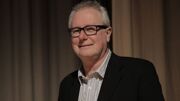 Iain Pattinson is a writer, script editor and broadcaster who writes I’m Sorry I Haven’t a Clue. He won three Sony Gold Awards, as well as winning a British Comedy Award, a Broadcasting Press Guild Award, a TRIC, and a Viewers and Listeners Award.
Iain Pattinson is a writer, script editor and broadcaster who writes I’m Sorry I Haven’t a Clue. He won three Sony Gold Awards, as well as winning a British Comedy Award, a Broadcasting Press Guild Award, a TRIC, and a Viewers and Listeners Award.
Professor Mark Philp (Political Philosopher and Historian of Political Thought)
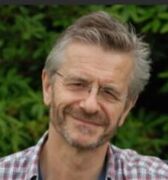 Professor Mark Philp is a British political philosopher and historian of political thought who specialises in British political thought in the late 18th and early 19th centuries.
Professor Mark Philp is a British political philosopher and historian of political thought who specialises in British political thought in the late 18th and early 19th centuries.
Professor Philp was a Fellow of Oriel College from 1983 to 2013, and was head of the then newly created University of Oxford Department of Politics and International Relations from 2000 to 2005.
In 2010 he completed a three-year digitisation project of the Diary of William Godwin, 1788-1836, funded by a Leverhulme Research Project Grant.
He is currently professor of History and Politics at the University of Warwick and a Senior Reader for the Canterbury Institute, an independent centre for research and learning in Oxford. He researches political theory and political sociology, most recently on justice in relation to ageing, political corruption and issues relating to standards in public life, as well as in the history of political thought and British history at the time of the French Revolution.
He is currently working on the re-imagining of democracy at the end of the eighteenth and the beginning of the nineteenth centuries, John Stuart Mill’s Autobiography, the Godwin Diaries, political realism and political ethics, and the history of political thought. Professor Philp chairs the Research Advisory Board to the Committee on Standards in Public Life and contributed the paper Public Ethics and Political Judgment to the Committee’s inquiry on Ethics in Practice in July 2014.
Professor Philp is the author of numerous books including Thomas Paine (Oxford University Press) and Political Conduct (Harvard University Press). He is also Series Editor of the Oxford University Press Founders of Modern Political and Social Thought series, which presently includes volumes on Plato, Aristotle, Aquinas, Machiavelli, Rousseau, Tocqueville and Durkheim.
Professor Keith Beven (Distinguished Hydrologist)
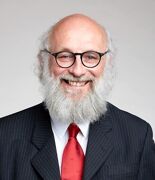 Keith Beven was educated at Chislehurst and Sidcup Grammar School, graduated with a Bachelor of Science degree in geography from the University of Bristol in 1971 and was awarded a PhD from the University of East Anglia (UEA) in 1975 for research on catchment hydrology supervised by Keith Clayton.
Keith Beven was educated at Chislehurst and Sidcup Grammar School, graduated with a Bachelor of Science degree in geography from the University of Bristol in 1971 and was awarded a PhD from the University of East Anglia (UEA) in 1975 for research on catchment hydrology supervised by Keith Clayton.
Keith worked at the University of Leeds (1974–1977) and the Institute of Hydrology, Wallingford (1977–1979 and 1982–1985). He was an assistant professor at the University of Virginia and has held visiting positions at the University of California, Santa Barbara (1996) and École Polytechnique Fédérale de Lausanne (EPFL), Lausanne, Switzerland; KU Leuven, Belgium and Uppsala University and the Swedish University of Agricultural Sciences (SLU) Uppsala, Sweden as Konung Carl XVI Gustafs Gästprofessor i Miljövetenskap in 2006–2007.
Keith Beven has worked at Lancaster University for over 30 years (joining in 1985) and is now a Distinguished Professor Emeritus in the Lancaster Environment Centre. He is the first hydrologist to be elected as a Fellow of the Royal Society in 50 years, is the most highly cited in the field, and has published 10 books and over 450 papers.
His main research interests are in hydrological modelling and understanding the prediction uncertainties associated with environmental models. He was the originator with Mike Kirkby of the TOPMODEL Concepts and the originator of the Generalised Likelihood Uncertainty Estimation (GLUE) methodology. GLUE has been applied to a wide variety of fields including rainfall-runoff modelling, flood inundation, water quality modelling, sediment transport, recharge and groundwater modelling, vegetation growth models, aphid populations, forest fire and tree death modelling. He is working on novel modelling of flow and transport on hillslopes and in catchments, modelling the impacts of climate and land management on flood runoff and flood frequency, nonparametric estimation of the rainfall-flow nonlinearity, and flood forecasting.
He has published 10 books and over 350 peer reviewed papers. Recent books include Environmental Modelling: An Uncertain Future (2009); a 4th Edition of Shaw’s Hydrology in Practice (with Nick Chappell and Rob Lamb, 2011) and a 2nd Edition of Rainfall-Runoff Modelling: The Primer (2012). Both Environmental Modelling and Rainfall-Runoff Modelling have been translated into Chinese.
In 2017, Beven was elected a member of the US National Academy of Engineering for contributions to the understanding of hydrological processes and development of the foundations of modern hydrological modelling. His awards and honours also include Fellow of the American Geophysical Union, King Carl XVI Gustaf Professorship in Environmental Science, President's Prize of the British Hydrological Society and Honorary DSc, University of Bristol.
Will Hutton (Leading Political Journalist)
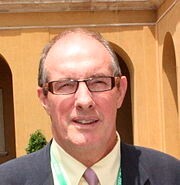 Will Hutton studied A Level Geography, History and Economics at Chislehurst and Sidcup Grammar School before reading Sociology and Economics at Bristol University. His career started as an equity salesman for a stock broker before leaving to study for an MBA at INSEAD at Fontainebleau near Paris. He later moved on to work in television and radio spending ten years with the BBC, including working as the economics correspondent for Newsnight from 1983-1988. He spent four years as editor-in-chief at The Observer and director of The Guardian National Newspapers. As well as a columnist, author and chief executive, Will Hutton is a governor of The London School of Economics.
Will Hutton studied A Level Geography, History and Economics at Chislehurst and Sidcup Grammar School before reading Sociology and Economics at Bristol University. His career started as an equity salesman for a stock broker before leaving to study for an MBA at INSEAD at Fontainebleau near Paris. He later moved on to work in television and radio spending ten years with the BBC, including working as the economics correspondent for Newsnight from 1983-1988. He spent four years as editor-in-chief at The Observer and director of The Guardian National Newspapers. As well as a columnist, author and chief executive, Will Hutton is a governor of The London School of Economics.
Dr Alan Makepeace (Eminent Oncologist)
 Alan Makepeace studied at Chis and Sid between 1961 and 1968. Alan initially trained as a chemical engineer obtaining a first class honours degree from Imperial College London. He subsequently commenced medical training, qualifying in 1977 from King's College Hospital London.
Alan Makepeace studied at Chis and Sid between 1961 and 1968. Alan initially trained as a chemical engineer obtaining a first class honours degree from Imperial College London. He subsequently commenced medical training, qualifying in 1977 from King's College Hospital London.
Initial postgraduate training was in surgery, becoming a fellow of the Royal College of Surgeons of England and a fellow of the Royal College of Surgeons of Edinburgh in 1981 and undertook post fellowship training in plastic surgery.
He entered into clinical oncology in 1982, being a registrar and senior registrar on the Middlesex/Mount Vernon rotation and has acted as locum to the Windeyer. He was the professorial chair of Radiation Oncology at the Middlesex Hospital prior to being appointed his current consultant post at Mount Vernon Hospital.
He is responsible for the breast service for the Mount Vernon Cancer Network providing the service to the South Bucks NHS Trust (Wycombe General Hospital). Dr Makepeace was the National Director of Continuing Professional Development for the Royal College of Radiologists as well-being a member of their Training and Accreditation Committee.
Dr Makepeace is a senior oncologist based at the Mount Vernon Cancer Centre and has specialised solely in the treatment of breast cancer for over 20 years. He has also led the development of the chemotherapy service for breast cancer at The Chiltern Hospital which is staffed by three specialist chemotherapy nurses.
Professor John R. Morgan (Emeritus Professor History & Classics)
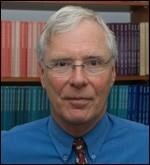 John was a pupil at Chislehurst and Sidcup (he was taught Latin and Greek by the legendary Mrs E.L. Jackson) from 1961 to 1968, when he went to Lincoln College, Oxford, to read Classics. John stayed on in Oxford to take a D.Phil. degree, which was awarded in 1978. In 1979 John was appointed Lecturer in Classics at Swansea University (then called University College of Swansea), and remained there for the rest of his career, retiring as Professor of Greek in 2015.
John was a pupil at Chislehurst and Sidcup (he was taught Latin and Greek by the legendary Mrs E.L. Jackson) from 1961 to 1968, when he went to Lincoln College, Oxford, to read Classics. John stayed on in Oxford to take a D.Phil. degree, which was awarded in 1978. In 1979 John was appointed Lecturer in Classics at Swansea University (then called University College of Swansea), and remained there for the rest of his career, retiring as Professor of Greek in 2015.
John’s doctoral dissertation was on the ancient Greek novelist Heliodorus of Emesa (3rd or 4th century CE), and he became a leading figure in the revival of scholarly interest in Greek literature written under the Roman Empire, especially the neglected forerunners of the modern novel. His extensive publications in this area include a translation of Heliodorus’ Ethiopian Story in Collected Ancient Greek Novels (University of California Press 1989; 2nd edition 2008), an edition with translation, introduction and commentary of Longus’ Daphnis and Chloe (Oxbow Books 1996), several edited volumes and many book-chapters and articles in learned periodicals. I am currently preparing an edition of Heliodorus for the Loeb Classical Library.
While at Swansea John founded and led KYKNOS, the Centre for Research on the Narrative Literatures of the Ancient World (‘kyknos’ is the Ancient Greek for ‘swan’), which drew researchers from Japan, Belgium, Germany, Switzerland, France and Italy, as well as from the UK, to work with him. John was twice honoured with an Excellence in Teaching and Learning Award.
John was elected a Fellow of the Learned Society of Wales (Cymdeithas Ddysgedig Cymru) in 2016.
Professor Ian Sharp (Clinical Scientist and Lecturer)
Ian attended Chis and Sid between 1961 and 1968, going on to read Bacteriology at University of Birmingham. He forged a career as a clinical scientist with Public Health Labs, Collingdale where he specialised in Virology. Ian became Head of Quality PHE Microbiology Services for Public Health England, overseeing all labs including Porton Down. After retirement Ian became a consultant for the World Health Organisation, lecturing on MSc courses. Ian was awarded his Professorship by the University of Greenwich.
Professor Roger Gosden (Author, Naturalist and Biomedical Research Professor)
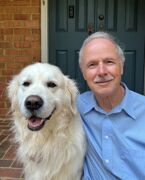 Roger became a writer, publisher, and master naturalist following an academic career in Physiology and Embryology which arced between the University of Cambridge and Weill Cornell Medical College in NYC as a Professor & Research Director in Reproductive Biology.
Roger became a writer, publisher, and master naturalist following an academic career in Physiology and Embryology which arced between the University of Cambridge and Weill Cornell Medical College in NYC as a Professor & Research Director in Reproductive Biology.
Roger’s research was focused on understanding, forecasting and treating infertility. In addition to around 300 scientific articles and books, he has also been a journal editor, broadcaster and conference organiser, and has written for newspapers and magazines.
He attributes his unusual career to his time at Chis and Sid and the foundations laid by his Biology teacher, W.H. Freeman. His career has embraced professorships in four countries. He teaches endocrinology at William & Mary, Virginia, USA, as an honorary professor, but is otherwise now a full-time writer and publisher alongside his beekeeping and conservation work as an affiliated Virginia Master Naturalist.
His most recent title, written under the pseudonym Rowan Gordon, is The Boy Who Could Bee.
Professor David Masser (Leading Mathematician)
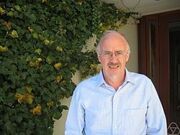 David Masser is a professor of Mathematics at the University of Basil, Switzerland.
David Masser is a professor of Mathematics at the University of Basil, Switzerland.
David obtained his Ph.D. from Cambridge University in 1974, he has also taught at the University of Michigan. David is known for his work in number theory and was elected to the Royal Society in 2005. Professor Masser formulated the ABC conjecture and it is stated that this is the most important unresolved problem in Diophantine analysis.
Professor Paul Durrington (International Medical Researcher)
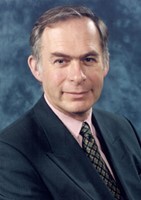 After leaving Chislehurst and Sidcup Grammar School, Paul Durrington went on to read Physiology and Medicine at Bristol University, before moving to the University of Manchester in 1976 as a lecturer. Paul visited the Division of Metabolic Medicine at the University of California, San Diego as British Heart Foundation Travelling Fellow (1979-80). He was made a FRCP (London) in 1987, FRCPath in 1994, Fellow of the American Heart Association in 2001 and Fellow of the American College of Physicians in 2009. Paul is currently Honorary Professor of Medicine in the Cardiovascular Research Group in the School of Biomedicine and Consultant Physician at Manchester Royal Infirmary where he leads the Greater Manchester Vascular Research Network.
After leaving Chislehurst and Sidcup Grammar School, Paul Durrington went on to read Physiology and Medicine at Bristol University, before moving to the University of Manchester in 1976 as a lecturer. Paul visited the Division of Metabolic Medicine at the University of California, San Diego as British Heart Foundation Travelling Fellow (1979-80). He was made a FRCP (London) in 1987, FRCPath in 1994, Fellow of the American Heart Association in 2001 and Fellow of the American College of Physicians in 2009. Paul is currently Honorary Professor of Medicine in the Cardiovascular Research Group in the School of Biomedicine and Consultant Physician at Manchester Royal Infirmary where he leads the Greater Manchester Vascular Research Network.
Julian Spalding (Gallery Curator and Author)
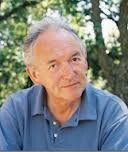 Julian Spalding is a writer, broadcaster and former museum director. Considered to be a controversial maverick and outspoken critic of the art world, he has been a regular contributor to arts, news and current affairs programs on radio and television. After leaving Chislehurst and Sidcup Grammar School he went on to study Art History at Nottingham University and Art at Nottingham Art College. Julian began his career as an art assistant at museums in Leicester and Durham before becoming Director of Galleries in Sheffield, Manchester and Glasgow. During his career as curator he established several award-winning innovative galleries and museum services. In 1999 Julian was awarded The Lord Provost’s Prize for Services to the Visual Arts in Glasgow for his directorship of Glasgow galleries and museums. Since 2001 he has concentrated on his writing, winning the Banister Fletcher Prize in 2006 for his book ‘The Art of Wonder’.
Julian Spalding is a writer, broadcaster and former museum director. Considered to be a controversial maverick and outspoken critic of the art world, he has been a regular contributor to arts, news and current affairs programs on radio and television. After leaving Chislehurst and Sidcup Grammar School he went on to study Art History at Nottingham University and Art at Nottingham Art College. Julian began his career as an art assistant at museums in Leicester and Durham before becoming Director of Galleries in Sheffield, Manchester and Glasgow. During his career as curator he established several award-winning innovative galleries and museum services. In 1999 Julian was awarded The Lord Provost’s Prize for Services to the Visual Arts in Glasgow for his directorship of Glasgow galleries and museums. Since 2001 he has concentrated on his writing, winning the Banister Fletcher Prize in 2006 for his book ‘The Art of Wonder’.
Professor Nigel West (Emeritus Professor Physiology)
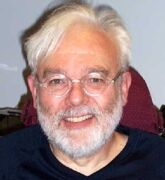 Nigel West attended Chis and Sid from 1959, the first member of his family to attend school past the age of fourteen. He found his first year at the school tough going, and finished 29th in a class of 30. Nigel acknowledges that his academic performance was hindered by his naivety, for example only by the end of the year did he realise that there was a vocabulary section in the back of the French textbook. It was determined by the powers that be that he should drop Latin in favour of woodwork.
Nigel West attended Chis and Sid from 1959, the first member of his family to attend school past the age of fourteen. He found his first year at the school tough going, and finished 29th in a class of 30. Nigel acknowledges that his academic performance was hindered by his naivety, for example only by the end of the year did he realise that there was a vocabulary section in the back of the French textbook. It was determined by the powers that be that he should drop Latin in favour of woodwork.
Nigel began to find his feet the following year and achieved respectable “O” level results. He loved both History, and English Literature, and also the Biological Sciences. He joined the science stream in the sixth form, where he says he was fortunate enough to be taught by Bill Freeman (Zoology), “Rocky” Knight (Botany) and Martyn Berry (Chemistry).
Although Nigel exhibited little in the way of athletic prowess, he did complete a fifty-mile charity walk from Eltham to Hastings, much to the surprise of Bert Williams, a lovely man who was the PE teacher. Nigel recalls walking in a pair of suede Chelsea boots (after all it was the sixties)!
Nigel pursued his love of Zoology and was accepted by the University of Bristol having done well at the interview. After completing his Zoology degree at Bristol, he followed a young faculty member, Dr. David Jones, out to the University of British Columbia (UBC) to do graduate work under his supervision. The department was full of dynamic young faculty, including David Suzuki, who went on to become a science broadcaster and environmental activist. Nigel completed a PhD in Comparative Animal Physiology and was then awarded a Killam postdoctoral fellowship, which allowed him to perform further research, this time on the energetics of bird flight. By this time Nigel’s interests began to centre on the control of the cardiovascular and respiratory systems in vertebrates.
In 1978 Nigel joined the faculty of Wellesley College (Massachusetts) as an Assistant Professor. He returned to Canada after two years joining the Physiology department at the College of Medicine, University of Saskatchewan. Nigel was engaged to perform research in the area of cardiovascular and respiratory physiology and to secure funding for the development of a laboratory. This continued for twenty-five years, after which he increased his teaching commitments and involvement in graduate administration. For the three years before his retirement Nigel was fortunate enough to be engaged as a visiting faculty member at St. Georges Medical School in Grenada, teaching respiratory physiology. After retirement, Nigel retains his interest in Physiology, and also spends time indulging in the hobby of astrophotography, which he finds is both rewarding and frustrating in equal measure.
Peter J Hubbard OBE (Inventor and Explosive Ordnance Disposal Expert)
 Peter John Hubbard OBE attended Chislehurst and Sidcup Grammar School, then went to University at Sheffield where he studied Chemistry. In 1967 he joined the Ministry of Defence as a Scientific Officer and served mainly at Fort Halstead in Kent.
Peter John Hubbard OBE attended Chislehurst and Sidcup Grammar School, then went to University at Sheffield where he studied Chemistry. In 1967 he joined the Ministry of Defence as a Scientific Officer and served mainly at Fort Halstead in Kent.
Peter’s first task was to try to solve the age-old problem of the premature explosion of artillery shells in the barrels of the guns. This he did effectively in collaboration with W J Stanley for 105 mm Abbot II ammunition through a series of diagnostic trials that showed the problem was caused by ignitions in the main explosive charge contained in the shell producing explosions rather than detonations. Changes in the manufacturing process prevented further events and the Abbot II ammunition was used successfully in the Falklands Campaign: 17,000 rounds fired with no premature explosions. Subsequently Abbot Mk II has been used in various overseas campaigns and has been fired 2 million times without premature.
In the Autumn of 1971, Peter in collaboration with M A Barker MBE invented Pigstick, the most successful piece of bomb disposal equipment in UK Army history. Pigstick used a novel means of neutralizing the terrorist device, and is still front-line equipment 50 years later having seen Service in Northern Ireland, UK mainland and many overseas campaigns. It has neutralized more than 12,000 terrorist devices with a success rate exceeding 99.97%. As it is used remotely even the small percentage of failures does not produce fatalities in the EOD operators.
In a twenty-five-year career in EOD (Explosive Ordnance Disposal) Peter invented second and third generation equipment and oversaw the development of other equipment types as Section Leader. He discovered the blast muffling effect of aqueous foam, and saw it introduced as a means of suppressing blast from conventional explosive charges and also as a means of reducing the impact of the dispersal of toxic materials such as nerve gas, and radioactive materials.
Professor Brian S Collins (Leading Academic)
 Professor Brian Collins (CB, FREng, FBCS, CITP, FIET, C Eng, FIOP, FICE, FRSA, RCDS, MA, and DPhil) took up the role of Professor of Engineering Policy at University College London on the 1st August 2011. Between 2006 and 2011 he was the Department for Transport’s Chief Scientific Adviser and CSA for the Department for Business Innovation and Skills. Brian was also Professor of Information Systems at Cranfield University. He chaired until the end of March 2012 the Engineering and Interdependency Expert Group for Infrastructure UK in Her Majesty’s Treasury. Brian was bestowed by Her Majesty the Queen the Honour of Companion of the Bath (CB) in the 2011 New Year’s Honours list and was elected a Fellow of the Royal Academy of Engineering in 2009. He holds a MA in Physics from Oxford University and a D.Phil in Astrophysics from the same University, and remains an Open Scholar at St Peters College.
Professor Brian Collins (CB, FREng, FBCS, CITP, FIET, C Eng, FIOP, FICE, FRSA, RCDS, MA, and DPhil) took up the role of Professor of Engineering Policy at University College London on the 1st August 2011. Between 2006 and 2011 he was the Department for Transport’s Chief Scientific Adviser and CSA for the Department for Business Innovation and Skills. Brian was also Professor of Information Systems at Cranfield University. He chaired until the end of March 2012 the Engineering and Interdependency Expert Group for Infrastructure UK in Her Majesty’s Treasury. Brian was bestowed by Her Majesty the Queen the Honour of Companion of the Bath (CB) in the 2011 New Year’s Honours list and was elected a Fellow of the Royal Academy of Engineering in 2009. He holds a MA in Physics from Oxford University and a D.Phil in Astrophysics from the same University, and remains an Open Scholar at St Peters College.
Richard Toop (Academic and Musician)
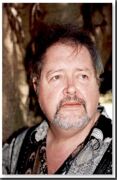 After leaving Chislehurst and Sidcup Grammar School Richard went on to gain a BA in Music Studies at Hull University followed by three years of uncompleted but invaluable Ph.D. studies on the origins of European indeterminacy. During this period Richard gave various performances as a pianist including (probably) the first solo performances of Erik Satie’s Vexations. From 1973-74. Richard was Karlheinz Stockhausen’s teaching assistant at the Staatliche Hochschule for Musik in Cologne. In 1975 Richard emigrated to Sydney, Australia to take up a junior lectureship at the Conservatorium where he is currently Reader in Music and Chair of the Musicology Unit.
After leaving Chislehurst and Sidcup Grammar School Richard went on to gain a BA in Music Studies at Hull University followed by three years of uncompleted but invaluable Ph.D. studies on the origins of European indeterminacy. During this period Richard gave various performances as a pianist including (probably) the first solo performances of Erik Satie’s Vexations. From 1973-74. Richard was Karlheinz Stockhausen’s teaching assistant at the Staatliche Hochschule for Musik in Cologne. In 1975 Richard emigrated to Sydney, Australia to take up a junior lectureship at the Conservatorium where he is currently Reader in Music and Chair of the Musicology Unit.
Colin Bennett (TV Presenter, Writer and Actor) 1944 – 2024
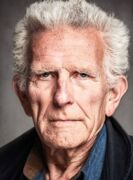 Colin graduated RADA in 1973 where he was named most promising actor of the year. His television roles included "Mr Bennett", the accident-prone caretaker for Tony Hart in the BBC children's programmes Take Hart (1977–1983) and Hartbeat (1984–1989). Other roles included Seth Neddermyer in Oppenheimer (1980), Nathaniel Mustard in A Killing on the Exchange (1987) Ben’s father in Rebecca (2020), Old Andy in The Full Monty (2023) and Glen in Ocean Deep (2023)
Colin graduated RADA in 1973 where he was named most promising actor of the year. His television roles included "Mr Bennett", the accident-prone caretaker for Tony Hart in the BBC children's programmes Take Hart (1977–1983) and Hartbeat (1984–1989). Other roles included Seth Neddermyer in Oppenheimer (1980), Nathaniel Mustard in A Killing on the Exchange (1987) Ben’s father in Rebecca (2020), Old Andy in The Full Monty (2023) and Glen in Ocean Deep (2023)
He also portrayed the father in the 1985 Yellow Pages/Hornby advert Signal Box - although only in a later edit in which he thanked the son for his present. His CV also boasts credits in police drama The Bill, BBC soap EastEnders and Casualty.
Among other television duties, he presented Night Shift and You Should Be So Lucky, as well as appearing in The Hitchhiker's Guide to the Galaxy as Zarquon. He also made a guest appearance in Last of the Summer Wine in 1999. He wrote a couple of TV series including Captain Zep - Space Detective and Luna before moving into the production field. He has a background in acting in and directing plays notably in 1978 appearing in, and directing, a musical version of The Point! alongside Davy Jones and Mickey Dolenz. Bennett later worked with Dolenz on Luna.
In 1987, Bennett's play, Hancock's Finest Hour about Tony Hancock (with Jim McManus in the starring role) was staged at the Boulevard Theatre in London. The play was revived in 2008 with Paul Henry in the title role.
He also ran a production company, An Acquired Taste TV Corp, and broadcast for television for about 17 years.
Timothy Page (Leading Photographer) 1944 - 2022
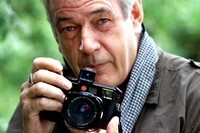 Timothy Page attended Chislehurst and Sidcup Grammar School from 1955 to 1961 before travelling across Europe, The Middle East and to India and Nepal. Timothy covered three decades of conflict across Indochina after becoming a professional photographer by chance as a 21-year-old during the attempted Laos coup of 1965. He smuggled the only pictures of the putsch out of the country and was offered a job at the UPI press agency as a result. Page is the subject of many documentaries and two films, and the author of many book. Sadly, Timothy passed away in in Brisbane, Australia during 2022.
Timothy Page attended Chislehurst and Sidcup Grammar School from 1955 to 1961 before travelling across Europe, The Middle East and to India and Nepal. Timothy covered three decades of conflict across Indochina after becoming a professional photographer by chance as a 21-year-old during the attempted Laos coup of 1965. He smuggled the only pictures of the putsch out of the country and was offered a job at the UPI press agency as a result. Page is the subject of many documentaries and two films, and the author of many book. Sadly, Timothy passed away in in Brisbane, Australia during 2022.
Terence Button (Senior Law Enforcement Agent and Public Servant)
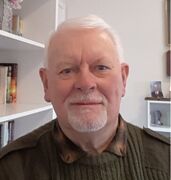 Terry was in the first intake of new boys at the “New School” in Hurst Road in 1954. He joined the Metropolitan Police in 1963 and served at West End Central Police Station in central London, the local stations of Eltham, Woolwich and Greenwich in the C.I.D., until 1970, when he transferred into Special Branch. During his service at Greenwich, he and his wife were badly injured when their house in Welling was burnt down in suspicious circumstances, delaying their ambition to migrate to Australia. The family, now of four, finally emigrated in December, 1974 and Terry joined what was then the Commonwealth Police, which later became the Australian Federal Police, where Terry rapidly rose through the ranks to Detective Superintendent. Along the way he was involved in high profile cases and spent two years as an undercover operative seconded to ASIO, the Australian Security Intelligence Organisation.
Terry was in the first intake of new boys at the “New School” in Hurst Road in 1954. He joined the Metropolitan Police in 1963 and served at West End Central Police Station in central London, the local stations of Eltham, Woolwich and Greenwich in the C.I.D., until 1970, when he transferred into Special Branch. During his service at Greenwich, he and his wife were badly injured when their house in Welling was burnt down in suspicious circumstances, delaying their ambition to migrate to Australia. The family, now of four, finally emigrated in December, 1974 and Terry joined what was then the Commonwealth Police, which later became the Australian Federal Police, where Terry rapidly rose through the ranks to Detective Superintendent. Along the way he was involved in high profile cases and spent two years as an undercover operative seconded to ASIO, the Australian Security Intelligence Organisation.
He also took an active role in the Australian Federal Police Association, serving as Victorian State President, Commissioned Officers’ Representative and as National President. In 1989 he took early retirement from the AFP and moved to the Senior Executive Service in the Attorney General’s Department of the Victorian Government, where he became the Deputy Sheriff of the State of Victoria. The Sheriff’s Office of Victoria was undergoing rapid growth in a transition from a traditional Sheriff’s Office responsible for the enforcement of civil proceedings, to a uniformed law enforcement body responsible for the enforcement of criminal proceedings. Terry played a major role in the transition and development of the ‘new’ organisation, as well as being responsible for all operational matters. He served as the Deputy Sheriff of Victoria for ten years before deciding to retire again. He now lives a moderately quiet life in Melbourne.
Air Vice-Marshall Michael Donaldson MBE (Educational Leader)
Air Vice-Marshall Michael Donaldson was a senior British Royal Air Force officer in the 1980s/1990s. Michael was promoted to Group Captain in 1987 and appointed as Officer Commanding RAF Wattisham, a position he held until succeeded by Group Captain Stuart Rance in 1989. He was promoted to Air Commodore on 1 April 1992 and was appointed as Senior Air Staff Officer of No.11 Group RAF, simultaneously holding the appointment of 22nd Commandant Royal Observer Corps (ROC) at a time when the majority of the ROC had been stood down, leaving a small number of Nuclear Reporting Cell Observers serving at various Armed Forces HQs all over the UK.
In February 1993 Michael was promoted to Air Vice-Marshall and was appointed as Commandant of the RAF Staff College, Bracknell. He held this position until January 1996 before retiring from the RAF. On leaving the RAF he became Principal of Yorkshire Coast College where he remained until retirement in 2003.
Dr Richard Russill (International Speaker, Mentor and Writer)
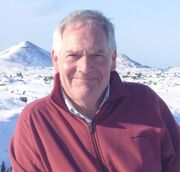 Richard attended Chislehurst and Sidcup Grammar School from 1954 to 1961 attaining five A Levels and a prestigious State Scholarship award. He then read Chemical Engineering at Leeds University.
Richard attended Chislehurst and Sidcup Grammar School from 1954 to 1961 attaining five A Levels and a prestigious State Scholarship award. He then read Chemical Engineering at Leeds University.
Richard's career has involved direct management roles in global companies and consultancy. He was with a global oil company in a number of positions including: refinery management; Capex project management; industrial relations; change-management; major site decommissioning, and responsible for procurement activities (upstream and downstream) for Europe.
Operating internationally as a speaker, mentor and writer on business and procurement issues, Richard is a leading authority on supply chain management. He leads Masterclasses in Organisational Transformation and Agility, and Procurement Risk Management, the latter topic also being the subject of his book, A Short Guide to Procurement Risk.
He is also a visiting lecturer on negotiation for the MSc programme at Hong Kong University. In late 2002 Richard was honoured by the Chartered Institute of Purchasing and Supply in receiving the prestigious Swinbank Award for his 'outstanding contribution to the profession' and for carrying its message into the business community at large.
Peter Longworth (Leading International Diplomat) 1942 - 2022
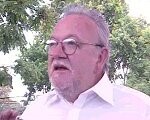 After leaving Chislehurst and Sidcup Grammar School, Peter Longworth went on to study Psychology at The University of Sheffield. His career began in 1965 as a general reporter at The Bristol Evening Post Fleet Street, moving on to the Westminster Press as their diplomatic correspondent. In 1974 he applied and was accepted to join The Diplomatic Service. Peter was posted to the Caribbean Department of the Foreign and Commonwealth Office. Peter Longworth held various different posts within the Foreign Office retiring as The High Commissioner to Zimbabwe in 2001.
After leaving Chislehurst and Sidcup Grammar School, Peter Longworth went on to study Psychology at The University of Sheffield. His career began in 1965 as a general reporter at The Bristol Evening Post Fleet Street, moving on to the Westminster Press as their diplomatic correspondent. In 1974 he applied and was accepted to join The Diplomatic Service. Peter was posted to the Caribbean Department of the Foreign and Commonwealth Office. Peter Longworth held various different posts within the Foreign Office retiring as The High Commissioner to Zimbabwe in 2001.
Professor Peter Birks (Leading Legal Scholar) 1941 – 2004
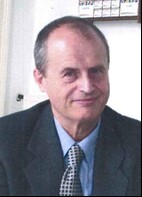 Peter Birks joined Chislehurst and Sidcup Grammar School in 1957 after spending his childhood in India. He was a talented rugby-player and cricketer and excelled in History and Latin. Although he contemplated a career as a Classics schoolmaster, he chose to read Law at University and won a place at Trinity College, Oxford. He obtained a Master of Law from University College London. He became a Fellow of the British Academy in 1989, an honorary Queen’s Counsel in 1995 and was a Fellow of All Souls College, Oxford. Peter Birks has written various books on Law and became the first general editor of English Private Law. He is widely credited as having sparked academic enthusiasm for the English law of Restitution, and is often considered to have been one of the greatest English legal scholars of the 20th century. Sadly Peter passed away in 2004.
Peter Birks joined Chislehurst and Sidcup Grammar School in 1957 after spending his childhood in India. He was a talented rugby-player and cricketer and excelled in History and Latin. Although he contemplated a career as a Classics schoolmaster, he chose to read Law at University and won a place at Trinity College, Oxford. He obtained a Master of Law from University College London. He became a Fellow of the British Academy in 1989, an honorary Queen’s Counsel in 1995 and was a Fellow of All Souls College, Oxford. Peter Birks has written various books on Law and became the first general editor of English Private Law. He is widely credited as having sparked academic enthusiasm for the English law of Restitution, and is often considered to have been one of the greatest English legal scholars of the 20th century. Sadly Peter passed away in 2004.
![]()
![]()
Philip Meheux (Internationally Renowned Cinematographer)
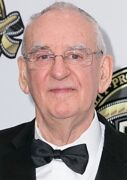 Philip Méheux attended Chis and Sid from 1952 to 1957. After making films as a teenager, he began his professional career with the BBC television Film unit rising quickly through the ranks to film cameraman on many notable documentaries and filmed television plays – many of which won awards at television festivals.
Philip Méheux attended Chis and Sid from 1952 to 1957. After making films as a teenager, he began his professional career with the BBC television Film unit rising quickly through the ranks to film cameraman on many notable documentaries and filmed television plays – many of which won awards at television festivals.
Philip’s first cinema feature, Black Joy, was the official British entry for the 1977 Cannes Film Festival.
Phil is an award- winning Director of Photography, recognised world-wide for his outstanding collaborations and photographic skills on iconic motion pictures such as the Long Good Friday, Goldeneye, The Mask of Zorro, Entrapment and Casino Royale amongst many others. He has often worked with directors John Mackenzie, Martin Campbell and Raja Gosnell.
His other feature films include: Ruby, Around the World in 80 days, Bicentennial Man, Edge of Darkness, Beyond Borders, Scum, Here Comes the Boom, The Smurfs, The Smurfs 2, The Legend of Zorro, The Saint and No Escape.
Phil was nominated for the BAFTA Award for Best Cinematography for the 2006 James Bond film Casino Royale. In 2015 Phil was presented with the American Society of Cinematographers International Award an honour reserved for cinematographers of internal repute who have made extraordinary contributions to film.
He is a member of the British Academy of Film and Television Arts, and served as president of the British Society of Cinematographers between 2002 and 2006, having been an elected member since n 1979. He is also an elected member of the Academy of Motion Picture Arts and Sciences and an honorary member of the Australian Cinematographers Society.
Professor Jeffrey Jon Shaw OBE (Parasitologist)
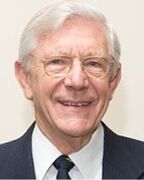 Jeffrey Jon Shaw gained a BSc in Zoology in 1960 at London University's Queen Mary College (now Queen Mary University) of London and a PhD in 1964 at the London School of Hygiene and Tropical Medicine under the guidance of Percy Cyril Garnham and Cecil Hoare. The field work for his doctoral thesis on the life cycle of Endotrypaum was performed in Central America in 1962 with Wellcome Trust support.
Jeffrey Jon Shaw gained a BSc in Zoology in 1960 at London University's Queen Mary College (now Queen Mary University) of London and a PhD in 1964 at the London School of Hygiene and Tropical Medicine under the guidance of Percy Cyril Garnham and Cecil Hoare. The field work for his doctoral thesis on the life cycle of Endotrypaum was performed in Central America in 1962 with Wellcome Trust support.
He contracted cutaneous leishmaniasis there; this motivated his lifelong interest in the disease. In the early 1960s, he and his colleague Alister Voller pioneered the use of indirect immunofluorescent techniques for the diagnosis of visceral leishmaniasis and Chagas Disease. In 1977 he was awarded a DSc at the London School of Hygiene and Tropical Medicine. In 1965 he and Ralph Lainson moved to Belém, Brazil where they founded the Wellcome Parasitology Unit. In 1994 he became a tenured senior professor at the University of São Paulo (USP) and has continued there until the present time.
His research focuses on different aspects of neglected tropical diseases (NTDs), in particular the leishmaniases and Chagas disease. Within these areas he has worked on their taxonomy, diagnosis and epidemiology. Presently his research is focused on the application of molecular methods to these areas.
Although officially retired, he is presently Senior Professor at São Paulo University's Biomedical Sciences Institute where he continues his research in its Parasitology Department.
Anthony Arlidge KC (Renowned King’s Counsel) 1937 – 2023
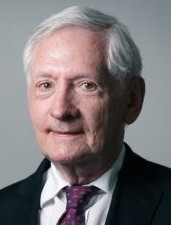 Tony Arlidge’s childhood desire was to be a ballet-dancer, which he abandoned, instead reading Law at Cambridge, where he was also a notable actor. He had many friends from those Cambridge years including Ian McKellen and Julian Curry.
Tony Arlidge’s childhood desire was to be a ballet-dancer, which he abandoned, instead reading Law at Cambridge, where he was also a notable actor. He had many friends from those Cambridge years including Ian McKellen and Julian Curry.
He has been described as a “A giant of his generation”. At the Bar, he was involved in numerous high-profile cases and was appointed Silk in 1981. Tony was a member of Red Lion Chambers throughout his career at the Bar and was Head of Chambers between 1997 until 2002 taking over from David Cocks QC following our move from 5 Kings Bench Walk to 18 Red Lion Court. He was one of the best-known advocates at the Criminal Bar: famed for his intellectual ability, irreverent boldness, unstoppable humour and love of the law. He was an extraordinarily talented and charismatic man, a gifted raconteur with an infectious laugh. He was a huge supporter of the junior bar, ever willing to lend a listening ear, and was a mentor and a great friend to many.
Tony Arlidge KC was one of the most outstanding lawyers and advocates of his time, and history will be not just kind to but in awe of him. He had the full apparatus: fine mind, work ethic, advocacy skills, and charm. He was the last opponent one wanted, professionally. A jury ate out of his hand and he was terrifyingly effective. One could – I did – when prosecuting him have everything to cruise to a guilty verdict, right up to the unanimous acquittal. If he prosecuted he was deadly, too fair, too accommodating, too tuned in to the court. It made defending a nightmare.
Tony was also the quintessential Renaissance man: an author of legal texts, historical books and literature, as well as being involved with a number of charities. His love of the theatre and literature, especially the works of Shakespeare, and his thespian talents never left him. Many members of Chambers were corralled into the staging of ‘Revels’ in the Middle Temple which included medieval dancing! As Master of Music in the Inn for many years, he catered for all musical tastes from highbrow to jazz and from concerts to musical dinner and dances. He also staged a number of theatrical productions and collaborated with many famous theatrical names, including Mark Rylance, Martin Shaw and Richard Griffiths.
Professor Colin Richmond (Historian: Late Medieval England)
Colin Richmond studied at Chislehurst and Sidcup Grammar School before receiving his undergraduate degree from the University of Leicester in 1959. He then began graduate study at the University of Oxford under the supervision of K.B. McFarlane. In 1963, he was awarded a Doctor of Philosophy (DPhil) degree for a thesis entitled "Royal Administration and the Keeping of the Seas, 1422-1485".
After completing his doctorate, Richmond took up a teaching post at Keele University, where he spent the remainder of his career. He was appointed Professor of Medieval History in 1993. He retired from full-time academia in 1997, and was appointed professor emeritus.
He has published a number of monographs, scholarly articles and book chapters on medieval history and the Holocaust, notable for their maverick style. He has also published a range of spoof articles in legitimate academic journals, collected in The Penket Papers and Other Stories and Fabrications: The Adventures of Anthony Woodville, 2 vols. (self-published, 2016). In 2005, he was the recipient of a festschrift edited by Margaret Aston and Rosemary Horrox, entitled Much Heaving and Shoving: Late-Medieval Gentry and their Concerns: Essays for Colin Richmond.
Professor Henry Kamen (Educator and Historian)
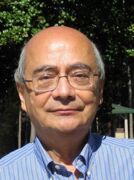 Henry Kamen was educated at Chislehurst and Sidcup Grammar School, from where he won a Major Scholarship to study at the University of Oxford, earning his doctorate at St Antony's College. During National Service he studied Russian, and his first book was a translation of the poems of Boris Pasternak (Boris Pasternak in the Interlude Poems 1945-1960).
Henry Kamen was educated at Chislehurst and Sidcup Grammar School, from where he won a Major Scholarship to study at the University of Oxford, earning his doctorate at St Antony's College. During National Service he studied Russian, and his first book was a translation of the poems of Boris Pasternak (Boris Pasternak in the Interlude Poems 1945-1960).
Between 1966 and 1992, Kamen taught early modern Spanish history at the University of Warwick. He has worked at various universities in Spain. In 1970, he was elected a Fellow of the Royal Historical Society. In 1984 he was appointed Herbert F. Johnson Professor at the Institute for Research in the Humanities, University of Wisconsin - Madison. He was a professor of the Higher Council for Scientific Research (CSIC) in Barcelona from 1993 until his retirement in 2002. Since then he has continued lecturing and writing, and has published extensively on Europe, Spain, and the Spanish Empire. He lives currently in Spain and in the United States. He is an influential contributor to the pages of the Spanish daily newspaper El Mundo.
Professor Roy Rand (Renowned Physicist) 1935 - 2022
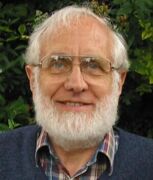 Roy was born in Eltham and attended Chislehurst and Sidcup Grammar School between 1946 and 1953. He graduated with BSc (Hons) in 1956 and his PhD in 1960 from University College London (UCL). He was employed as a lecturer at UCL until discussions during a visit by Robert Hofstadter led to a research position working with the Mark III Linear Accelerator at the High Energy Physics Laboratory (HEPL) at Stanford University. Roy stayed there until 1966, when he returned to England to work at the Daresbury Nuclear Physics Laboratory.
Roy was born in Eltham and attended Chislehurst and Sidcup Grammar School between 1946 and 1953. He graduated with BSc (Hons) in 1956 and his PhD in 1960 from University College London (UCL). He was employed as a lecturer at UCL until discussions during a visit by Robert Hofstadter led to a research position working with the Mark III Linear Accelerator at the High Energy Physics Laboratory (HEPL) at Stanford University. Roy stayed there until 1966, when he returned to England to work at the Daresbury Nuclear Physics Laboratory.
In 1970 Roy returned to HEPL, where he spearheaded the design of the superconducting recyclotron electron accelerator, with which energies of hundreds of MeV could be attained at considerable cost savings. He then accepted a position in 1974 as head of the department of physics at the University of Western Australia (UWA), where he led a project to develop a cryogenic niobium resonant bar for gravitational-wave detection with David Blair and Cyril Edwards, extending an idea by Bill Fairbank of Stanford. The project continued under Blair and Edwards long after Roy’s departure from UWA at the end of 1977, blossoming into a prominent effort and leading to the group’s participation in the LIGO project. Roy was elected a fellow of the American Physical Society in 1975. He returned to HEPL for a third time in 1978 and worked on the then-built superconducting recyclotron (achieving energies up to 400 MeV) until 1981 and the project’s premature demise.
Roy became a founding member of Imatron Inc in 1981 as vice president for research, where he played a key role in the development of an innovative cardiac ultrafast CT scanner, making possible high time-resolution images of a rapidly moving heart. The scanner had no mechanically moving parts and achieved the required speed via a rapidly scanning DC electron beam aimed at an x-ray target. For the high spatial resolution required, the major challenge was to create a tiny <1 mm beam spot in the face of space-charge repulsion at the required intensity. Whereas several accelerator physicists consulted by Imatron considered this to be a showstopper, Roy found a way to neutralise the beam and developed the theory and designed the instruments and methods which resulted in its successful implementation. As a result, the Imatron electron-beam scanners dominated the field of cardiac CT imaging for the next 20 years. Most crucially, these scanners made possible highly accurate measurement of calcium deposits in the coronary arteries, a method which became the most effective screening procedure for early heart-disease detection.
Another invention of significance is a high-power rotating x-ray tube for use in CT scanners, patented in 1991. Instead of the disk anode rotating in vacuum, in Roy’s design the whole tube rotates around a fixed disk anode, which can then be in direct contact with the cooling oil. This allowed much faster cooling of the anode and thus higher power scans at a rapid rate. This design was licensed to Siemens and is now widely used in their scanners.
Roy was also involved in designing an electron beam baggage scanner and explosives detector. In 2008 he was a finalist for the American Physical Society Industrial Physics Prize. After his retirement he continued to consult on electron-beam technology. As late as 2018 Roy was still writing complex technical papers about the use of high-density electron beams in medical products.
Roy worked in high-energy physics, nuclear physics, accelerator physics, and medical physics, and his versatility extended from theory to instrument design. Roy’s life work resulted in more than 25 patents and numerous publications, including the book Recirculating Electron Accelerators in 1984, and a legacy of medical innovation.
Michael Cooling (Author and Leading Horticulturalist)
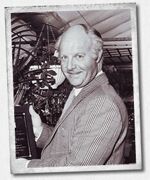 Michael Cooling attended school (1945-1950) then left at the age of 16 and went on to horticultural college. Michael joined his father’s business, Cooling’s Nurseries in Sevenoaks and now employs 150 staff. The nurseries have a national reputation for the widest range of plants, trees and shrubs in the UK. Michael has written a book “Blooming Wonderful” about his life and his time at Chislehurst and Sidcup Grammar.
Michael Cooling attended school (1945-1950) then left at the age of 16 and went on to horticultural college. Michael joined his father’s business, Cooling’s Nurseries in Sevenoaks and now employs 150 staff. The nurseries have a national reputation for the widest range of plants, trees and shrubs in the UK. Michael has written a book “Blooming Wonderful” about his life and his time at Chislehurst and Sidcup Grammar.
John Yeoman (Children's Author) 1934 - 2024
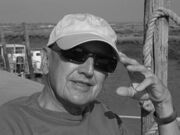
John Yeoman attended Chislehurst and Sidcup Grammar School, where he became involved in producing the school magazine. This was how he first met Quentin Blake and how the two first collaborated. John’s first book, A Drink of Water, was a collection of folktales, retold by John with the warmth and wit that he carried into his later books. A Drink of Water was the first book that Quentin illustrated.
John read English at Downing College, Cambridge and spent 28 years teaching English, for most of that time as Head of the English at the French Lycee in South Kensington.
John Yeoman and Quentin Blake continued to work together to create a series of picture books including Mouse Trouble, The Wild Washerwomen and Featherbrains. In addition to Books, John has written song lyrics for children’s television and radio. They also appeared together in one of their books - The World's Laziest Duck and Other Improbable Records -measuring an Octopus’ tentacle. In the illustration Quentin is on the left, and John is on the right. John and Quentin’s collaboration produced amazing results, with more than 30 books published all over the world, their last offering Meet the Family, published in 2022, is a rollicking rhyming book about an eccentric family, full of fun and high-jinx and all the things that the two did so well together as collaborators and friends. John passed away in July 2024.
Sir Quentin Blake (National Treasure)
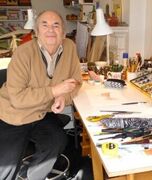 Quentin Blake attended Chislehurst and Sidcup Grammar School followed by National Service. He then studied English at Downing College, Cambridge, going on to do a post graduate teaching diploma at the University of London. He has always made his living as an illustrator, as well as teaching for over 20 years at the Royal College of Art, where he was head of the illustration department from 1978 to 1986.
Quentin Blake attended Chislehurst and Sidcup Grammar School followed by National Service. He then studied English at Downing College, Cambridge, going on to do a post graduate teaching diploma at the University of London. He has always made his living as an illustrator, as well as teaching for over 20 years at the Royal College of Art, where he was head of the illustration department from 1978 to 1986.
His first drawings were published in Punch while he was 16 and still at school. He continued to illustrate for Punch, The Spectator and other magazines over many years, while at the same time entering the world of children’s books with A Drink of Water by John Yeoman in 1960. He is known for his collaboration with writers such as Russell Hoban, Joan Aiken and, most famously, Roald Dahl.
Since the 1990’s Quentin Blake has had an additional career as exhibition curator, curating shows in, amongst other places, the National Gallery, the British Library and the Musée du Petit Palais in Paris.
In the last few years he has begun to work on larger-scale designs for hospitals, healthcare settings in the UK and France where his work can be seen in wards and public spaces. His books have won numerous prizes and awards. In 1999 he was appointed the first ever Children’s Laureate, a post designed to raise the profile of children’s literature. Quentin Blake was appointed CBE in 2005 and received a knighthood for ‘services to illustration’ in the New Year’s Honours for 2013.
Sir Quentin has established the Quentin Blake Centre for Illustration - the UK’s only charity for illustration. Quentin set up the organisation to create a place where illustration has a home and a fascinating but forgotten heritage site, New River Head, in Clerkenwell, London will be the UK’s centre for illustration, opening 2025.
Air Vice-Marshal John Ernsting OBE (Leading Aviator) 1928 - 2009
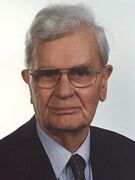 John Ernsting was born on April 21 1928 in Eltham, South-East London. He was educated at Chislehurst and Sidcup County Grammar School and Guy's Hospital Medical School, graduating with honors. He was commissioned into the RAF Medical Branch in 1954. For 25 years he worked in the altitude division of the IAM. In 1971 he was appointed its head, with responsibility for research, teaching and the direction of the specialist staff. During the late 1960s he was the RAF's aeromedical project officer for the development of the British versions of the American-built F-111, Phantom and Hercules aircraft. On leaving the RAF he moved to King's College, London, to teach and conduct research in human and aviation physiology and has written a number of books on Aviation Medicine. He was appointed OBE in 1959 and CB in 1992; sadly he passed away in 2009 aged 81.
John Ernsting was born on April 21 1928 in Eltham, South-East London. He was educated at Chislehurst and Sidcup County Grammar School and Guy's Hospital Medical School, graduating with honors. He was commissioned into the RAF Medical Branch in 1954. For 25 years he worked in the altitude division of the IAM. In 1971 he was appointed its head, with responsibility for research, teaching and the direction of the specialist staff. During the late 1960s he was the RAF's aeromedical project officer for the development of the British versions of the American-built F-111, Phantom and Hercules aircraft. On leaving the RAF he moved to King's College, London, to teach and conduct research in human and aviation physiology and has written a number of books on Aviation Medicine. He was appointed OBE in 1959 and CB in 1992; sadly he passed away in 2009 aged 81.
Alec Hester (Editor of the CERN Courier) 1928 – 2024
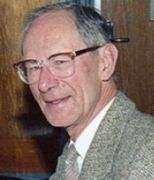 Alec Hester was a former editor of CERN Courier and later the Physics subject specialist at the CERN library for nearly 30 years. He was born in Hatfield, to the north of London, in 1928. He was educated at Chis and Sid from 1939 until 1946.
Alec Hester was a former editor of CERN Courier and later the Physics subject specialist at the CERN library for nearly 30 years. He was born in Hatfield, to the north of London, in 1928. He was educated at Chis and Sid from 1939 until 1946.
Alec graduated in Physics from Imperial College London in 1949. He continued there for his PhD, building a Van de Graaff accelerator to study (p, alpha) reactions in light nuclei. Yes, in those days postgraduate students built their own accelerators!
In 1952 Alec interrupted his studies to take a job in the publicity department of General Electric at its site in Kent. Nine years later he arrived in CERN to take over the editorship of CERN Courier from Roger Anthoine. The Courier was then just two years old, and it was during Alec’s period as editor that it began to move beyond its initial role as the house journal for CERN staff to one that communicated the work of CERN and other laboratories to a wider scientific and technical readership. Marking the end of Alec’s editorship in the December 1965 issue, Anthoine wrote: “The editing and production of our periodical, with limited means, requires not only very definite intellectual qualities, for collecting and processing information from all over the Laboratory, but also considerable physical and moral toughness to cope with the many dictates of production, which are the lot of every editor… It is mainly thanks to [Alec’s] drive that CERN Courier, which now has a circulation of 6000 copies (French and English versions combined), has risen from the rank of ‘internal information journal’ to that of ‘world spokesman for European sub-nuclear physics.”
In 1966 Alec moved to the CERN scientific information service as the physics subject specialist, remaining there until his retirement in February 1993. His accurate and painstaking work developing the library’s bibliographic databases provided the nucleus for those searchable on the CERN Document Server today.
Alec passed away in Geneva on 9 March 2024 at the age of 96.
Professor Brian E. Conway (Chemist) 1927 - 2005
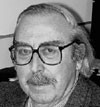 Brian Conway was born in Farnborough and attended Chislehurst and Sidcup Grammar School before gaining a Ph.D. at Imperial College in 1949. In 1956 he was recruited as an Associate Professor in the department of Chemistry at the University of Ottawa and in 1962 he was promoted to the rank of Full Professor.
Brian Conway was born in Farnborough and attended Chislehurst and Sidcup Grammar School before gaining a Ph.D. at Imperial College in 1949. In 1956 he was recruited as an Associate Professor in the department of Chemistry at the University of Ottawa and in 1962 he was promoted to the rank of Full Professor.
He is the author of more than 400 refereed scientific research articles and four books. Professor Conway was a ‘Complete Electrochemist’ in that he worked on nearly all aspects of electrochemistry. Amongst his most prestigious honours and awards are Fellow of the Royal Society of Canada (1968), The Electrochemical Society Henry Linford Medal (1984) and The Fellow of the Electrochemical Society of America (1995).
Eddie Harvey (Leading Jazz Musician) 1925 - 2012
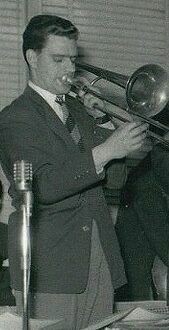 Edward Thomas Harvey was born in Blackpool in 1925 and grew up in Sidcup where he attended Chislehurst and Sidcup Grammar School. He became captivated by Jazz and acquired a trombone from an early age. During his National Service in the RAF he practised his technique and emerged at professional standard.
Edward Thomas Harvey was born in Blackpool in 1925 and grew up in Sidcup where he attended Chislehurst and Sidcup Grammar School. He became captivated by Jazz and acquired a trombone from an early age. During his National Service in the RAF he practised his technique and emerged at professional standard.
In 1950 with some work colleagues from a factory in Crayford where he worked as an engineering apprentice, he joined a band called Dixielanders. He met John Dankworth, Ronnie Scott and other musicians and became the Johnny Dunkworth Seven. He studied briefly at the Guildhall School of Music in 1959 and began work as a freelance arranger for Jack Parnell’s orchestra. From 1963-1972 he played piano in Humphrey Lyttelton’s band.
He taught music at various establishment’s including Guildhall and the Royal College of Music, he became Head of Jazz at the London College of Music.
Dr Cyril Cooling (Surgeon and Cancer Treatment Pioneer) 1923 - 2018
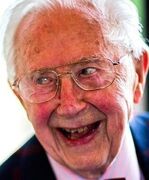 Cyril Cooling was a consultant surgeon at the Royal Marsden Hospital and then medical superintendent of Benenden Hospital in Kent. The second son of Frank Cooling, a newsagent, and Lilian M Cooling née Waygood, he won the coveted Bucknill scholarship to enter University College Hospital in 1941, the first pupil from his village school to gain entry to medical school with a scholarship. The headmaster was so excited that he gave the whole school a day off. He started his training through the London Blitz, using his free time to teach himself the saxophone so he could play in a jazz band to self-fund his way through medical school when not on fire warden duties.
Cyril Cooling was a consultant surgeon at the Royal Marsden Hospital and then medical superintendent of Benenden Hospital in Kent. The second son of Frank Cooling, a newsagent, and Lilian M Cooling née Waygood, he won the coveted Bucknill scholarship to enter University College Hospital in 1941, the first pupil from his village school to gain entry to medical school with a scholarship. The headmaster was so excited that he gave the whole school a day off. He started his training through the London Blitz, using his free time to teach himself the saxophone so he could play in a jazz band to self-fund his way through medical school when not on fire warden duties.
After qualifying in 1946, he served for two years in the RAF in Stranraer, kick-starting a lifelong love of Scotland with many subsequent holidays and eventual residence in his latter years.
After training posts in Ipswich and London, Cyril was appointed as a consultant oncology surgeon at the Royal Marsden Hospital and was part of the team that opened the Sutton branch in 1963, where he was instrumental in the establishment of the renowned breast cancer surgery unit there, pioneering less invasive forms of surgery than the radical mastectomies that were then the standard treatment. He was revered and respected by both patients and colleagues, always making time for anyone, ever-mindful of his own humble background.
At the peak of his career in London, in 1977 he moved to the Kent countryside to become the medical superintendent of Benenden Hospital, where he oversaw the construction of a new surgical wing and thoroughly enjoyed getting back into general surgery again.
Retirement in 1985 gave him the opportunity to further develop his love of Latin-American dancing with his wife Phyllis, whom he adored, and together they enjoyed many years of village life in Kent actively involved in amateur dramatics and other pursuits.
Predeceased by his wife Phyllis just a few months after they celebrated their 70th wedding anniversary in 2016, Cyril Cooling died on 18 August 2018 at the age of 95 from cerebrovascular disease and dementia.
Michael Carreck D.F.C (Bomber Command) 1920 - 2006
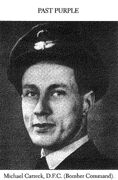 Michael joined Chislehurst and Sidcup Grammar School formally known as Sidcup County School for Boys in 1931. Michael was the first ever pupil to enrol at the new school which initially opened at 27 Station Road. After leaving school he joined the RAF serving during the Second World War. He flew fifty missions over enemy territory as a navigator and cheated all odds to survive. He was awarded the Distinguished Flying Cross for acts of courage and devotion.
Michael joined Chislehurst and Sidcup Grammar School formally known as Sidcup County School for Boys in 1931. Michael was the first ever pupil to enrol at the new school which initially opened at 27 Station Road. After leaving school he joined the RAF serving during the Second World War. He flew fifty missions over enemy territory as a navigator and cheated all odds to survive. He was awarded the Distinguished Flying Cross for acts of courage and devotion.
Michael’s experiences in what he calls ‘the flaming coffins of Bomber Command’ are conveyed in his semi-autobiographical novel Blaze of Glory.
Sqn Ldr Ian Hewitt (Squadron Leader) 1920 - 2015
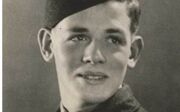 Ian Hewitt was born in 1920 in Manchester and educated at the County School, Sidcup. He joined the RAF Volunteer Reserve in April 1940 and trained as an air observer. He joined No 58 Squadron, operating the pre-war Whitley bomber. He completed five operations with the squadron, including one of the earliest raids on Berlin. After transferring to the Halifax-equipped No 35 Squadron he completed a further 11 operations. After attending a bomber leader’s course and receiving his commission, Hewitt returned to No 35. He bombed Essen and two weeks later attacked Tirpitz.
Ian Hewitt was born in 1920 in Manchester and educated at the County School, Sidcup. He joined the RAF Volunteer Reserve in April 1940 and trained as an air observer. He joined No 58 Squadron, operating the pre-war Whitley bomber. He completed five operations with the squadron, including one of the earliest raids on Berlin. After transferring to the Halifax-equipped No 35 Squadron he completed a further 11 operations. After attending a bomber leader’s course and receiving his commission, Hewitt returned to No 35. He bombed Essen and two weeks later attacked Tirpitz.
Squadron Leader Ian Hewitt was the navigator of a Halifax bomber shot down while attacking the German battleship Tirpitz. After crash landing on the frozen Lake Hokingen, in which Hewitt skillfully guided the pilot, the six-man crew vacated the burning aircraft, the flight engineer was captured but the others made their escape into Sweden. The burning Halifax, S for Sugar, melted the ice and the bomber sank to the bottom of the lake. In 1973, the wreck was recovered and has since been on display in the RAF Museum at Hendon.
On his return from Sweden he became an instructor at a bomber-training unit before joining No 405 (Vancouver) Squadron of the RCAF in 1942. In April 1943, the squadron joined the Pathfinder Force. As a navigator he had special responsibility to ensure that his flares and markers were placed accurately and on time for the main bomber force to use as aiming points. Hewitt flew his 50th and final operation on October 8 when he marked Hanover. Ian was assessed as “an outstanding navigator” and awarded a Bar to his DFC for his ‘devotion to duty, leadership and zeal’.
After serving as an instructor at the Pathfinder Navigation Training Unit, Ian left for RAF Croft in North Yorkshire, where he was the station navigation officer and where he met his future wife, who was serving on a nearby airfield as a sergeant. After spending three months serving with the British Air Forces of Occupation in Germany, he was demobilised in 1946. Ian then studied accountancy and in 1948 joined A J Downs & Co in Hull, rising to be a senior partner. Ian was elected a Fellow of the Institute of Chartered Accountants in 1957. He was also active in a number of veterans’ associations. Ian Hewitt married Mary Hall in July 1945; she and their two daughters survive him.
The Sedcopians Published Works
Sedcopian Sporting Greats
An interview with Sir Quentin Blake
The world-renowned illustrator Sir Quentin Blake attended Chis and Sid from 1943 to 1951. In the linked interview Quentin recalls aspects of his time at the school.
He has recently established the Quentin Blake Centre for Illustration - the UK’s only charity for illustration. Quentin set up the organisation to create a place where illustration has a home and a fascinating but forgotten heritage site, New River Head, in Clerkenwell, London, will be the UK’s Centre for Illustration, and is due to open in 2025.
An Interview with Quentin Blake: https://www.webofstories.com/play/quentin.blake/1
https://www.qbcentre.org.uk/https://www.facebook.com/QuentinBlakeCentre
Photographs From Bygone Years
1932
1937

1948

1952

1954

1955

1957

